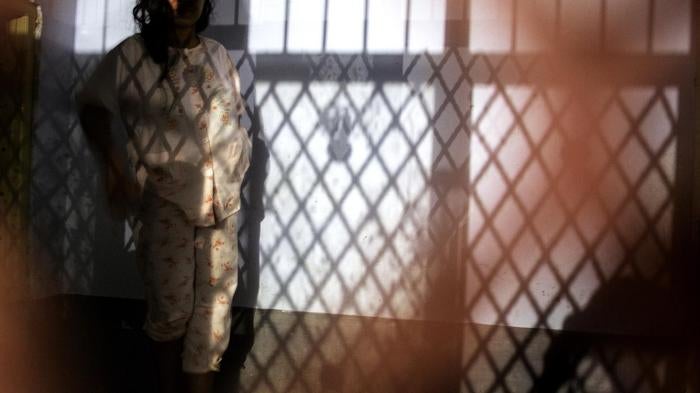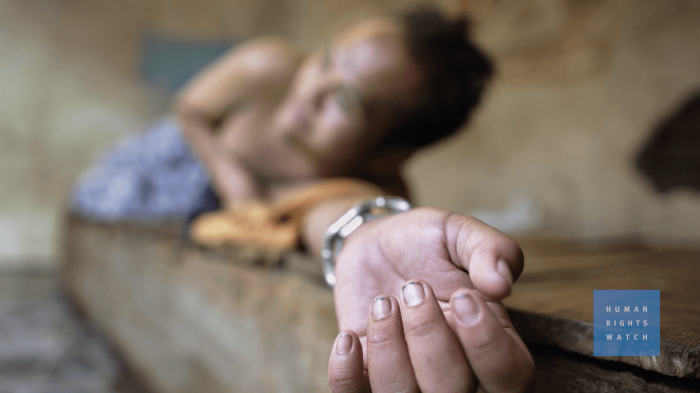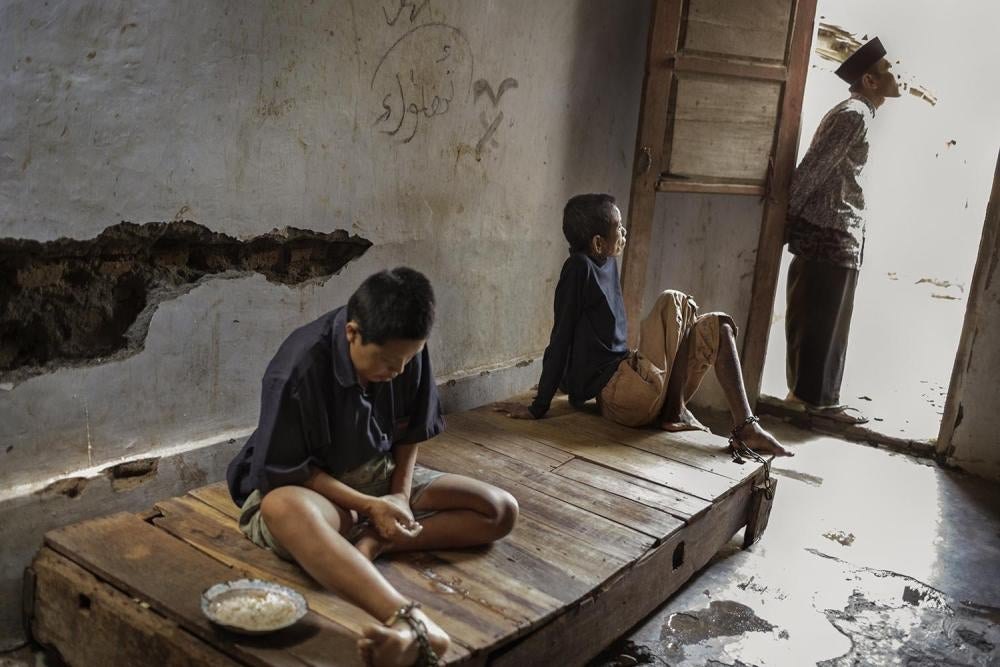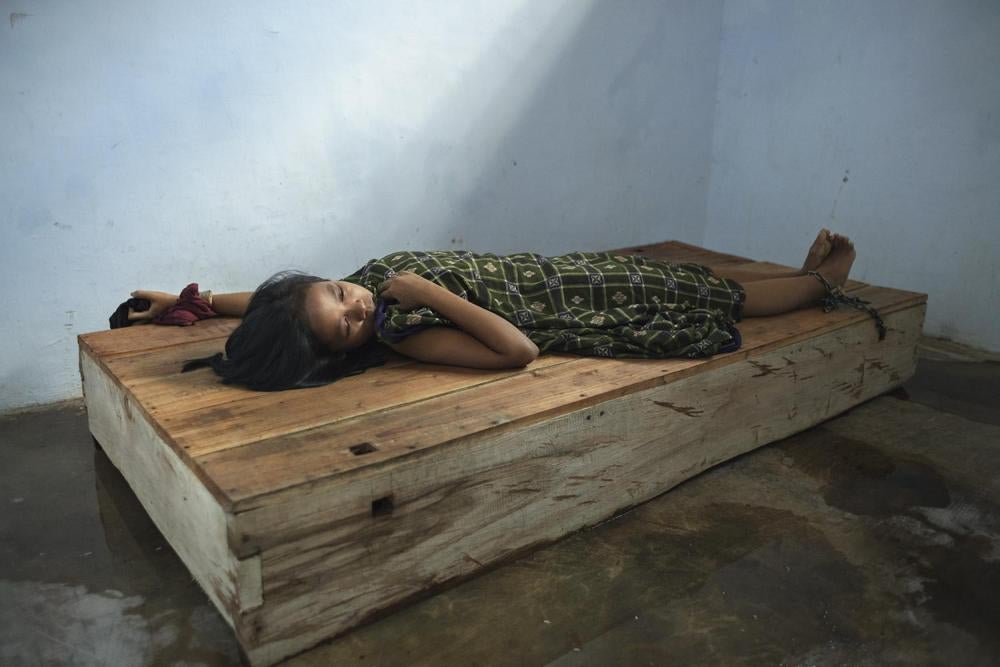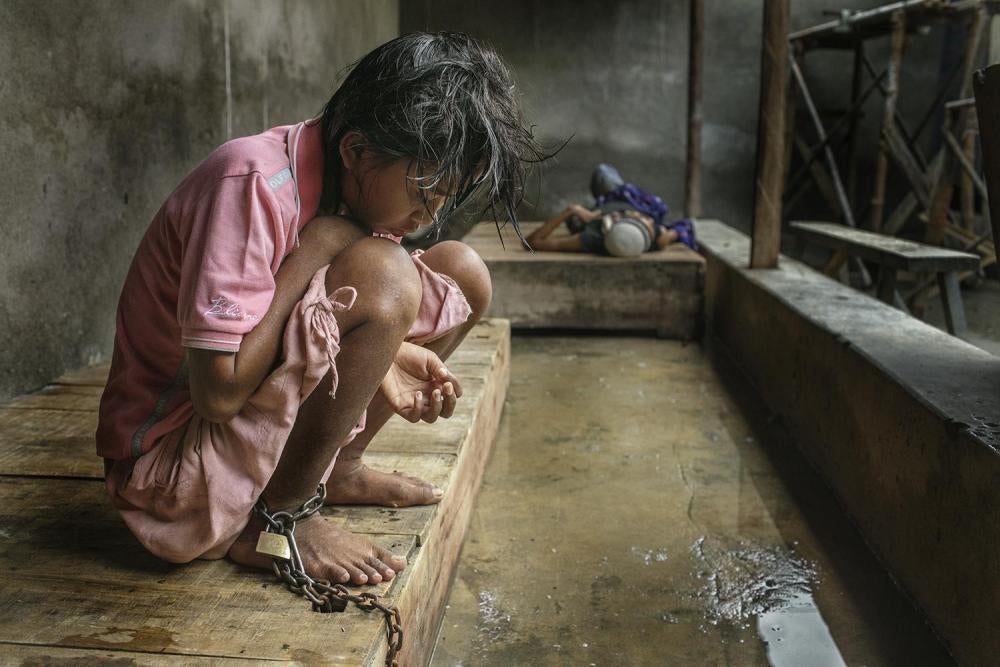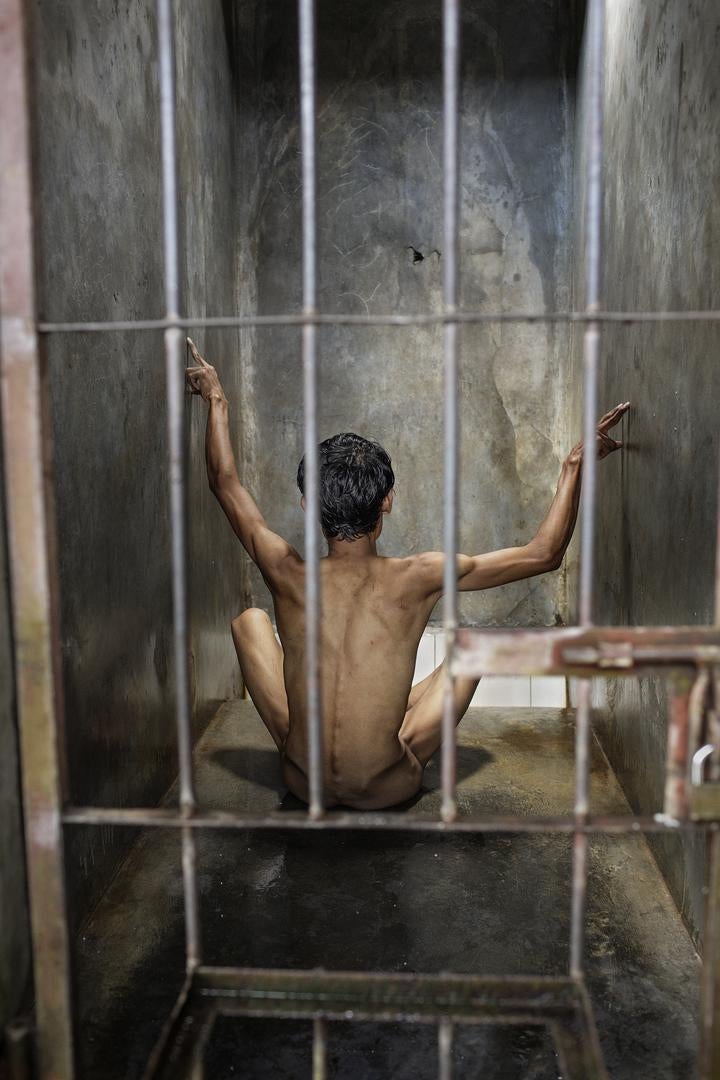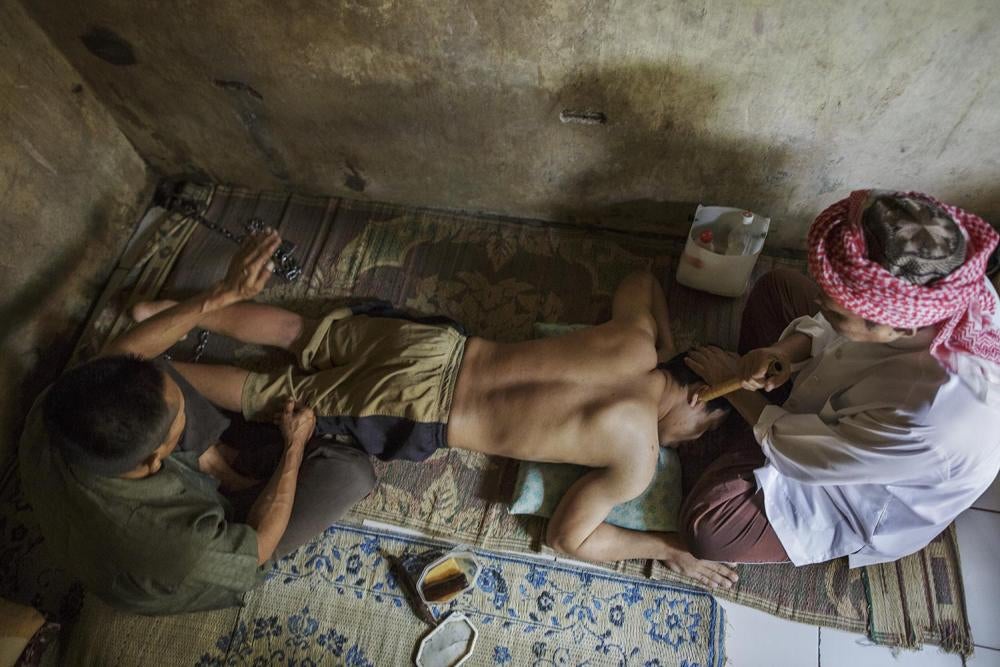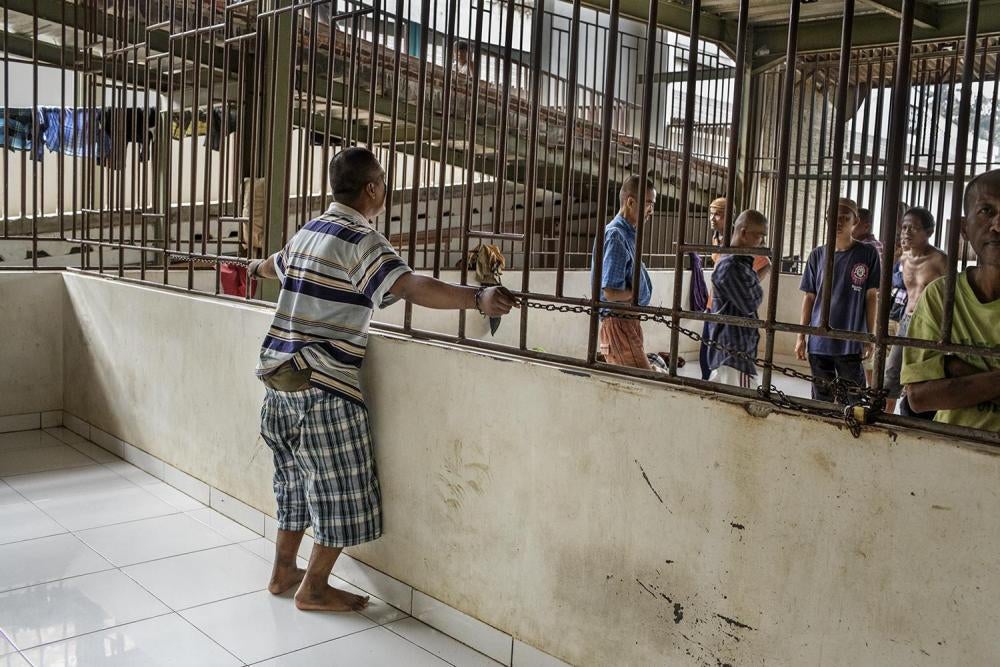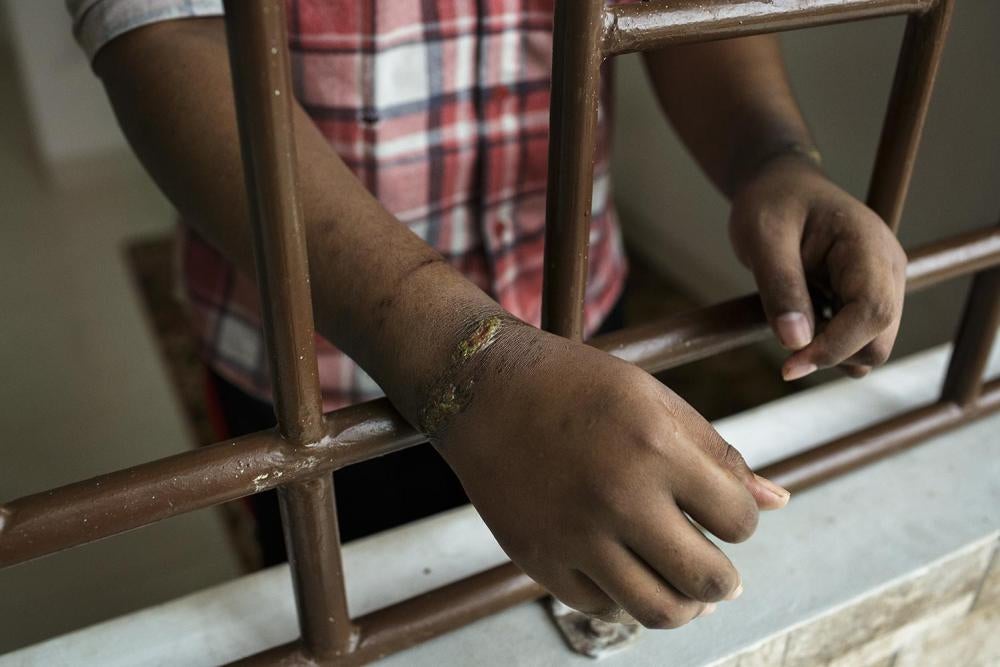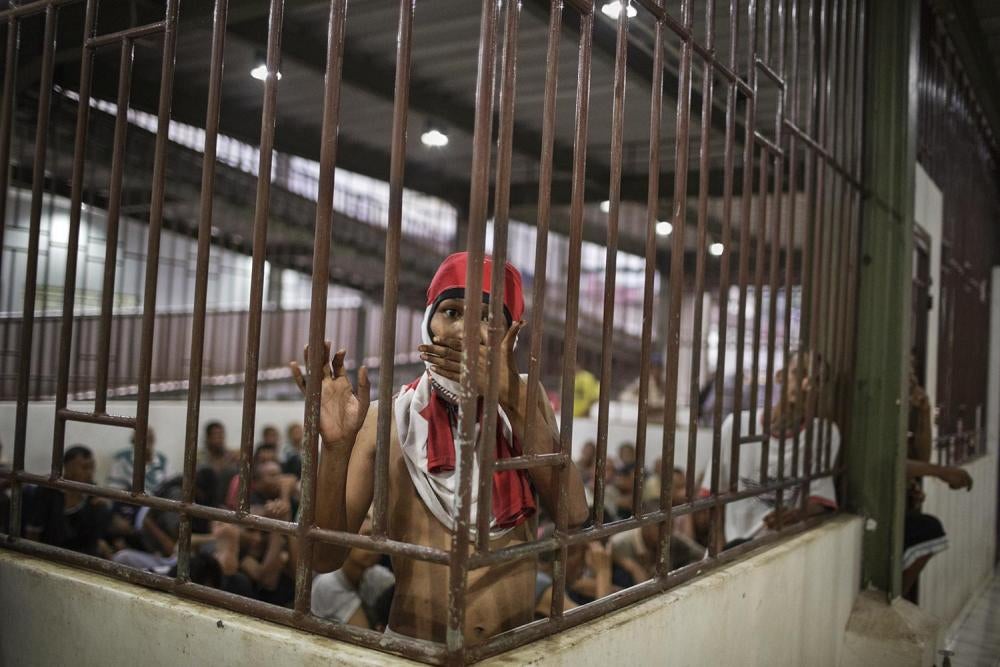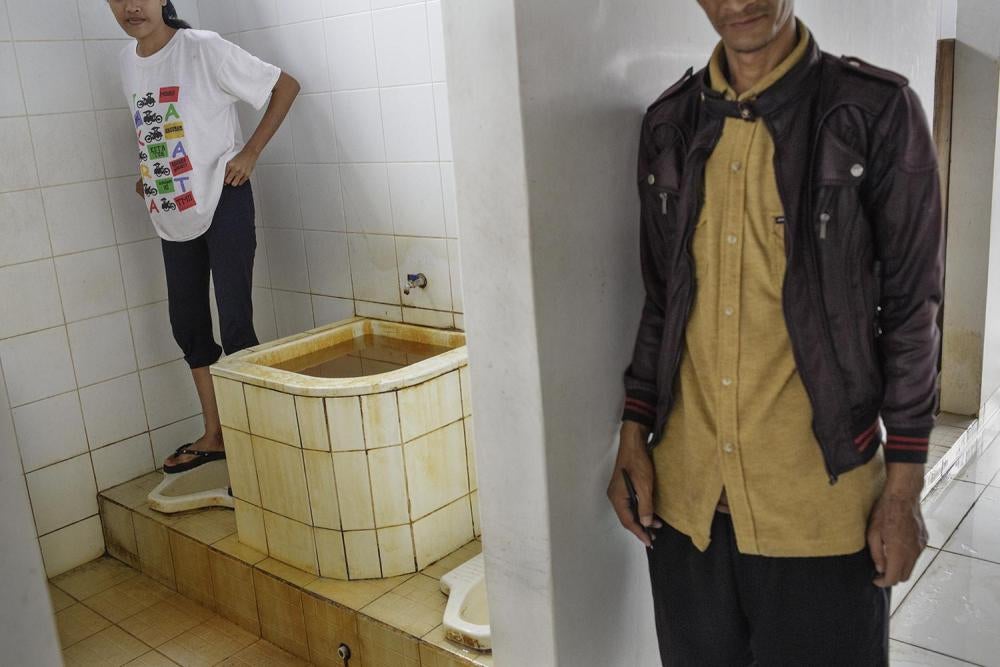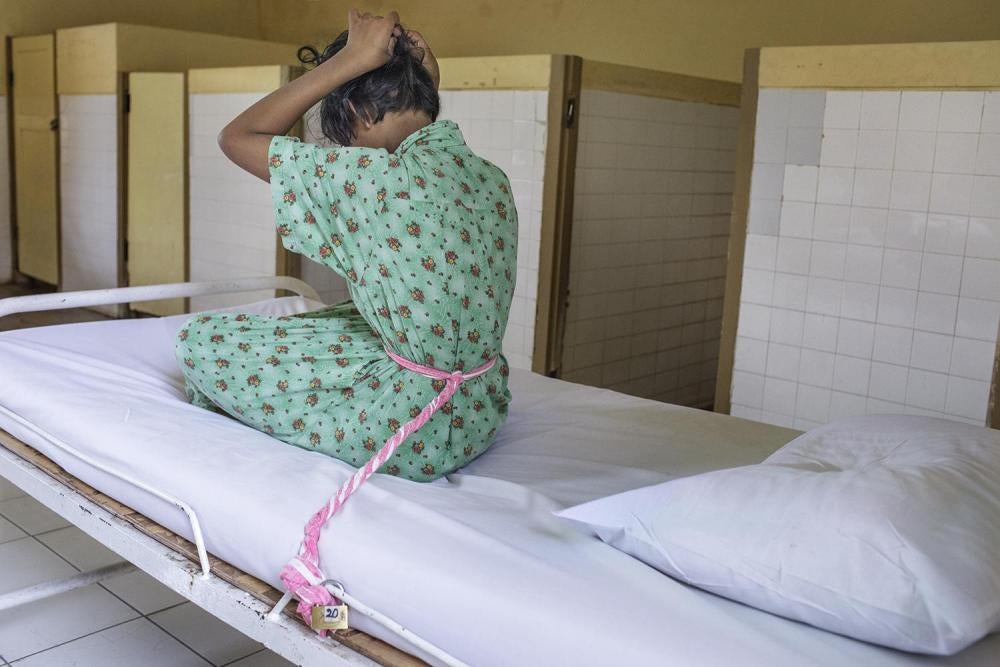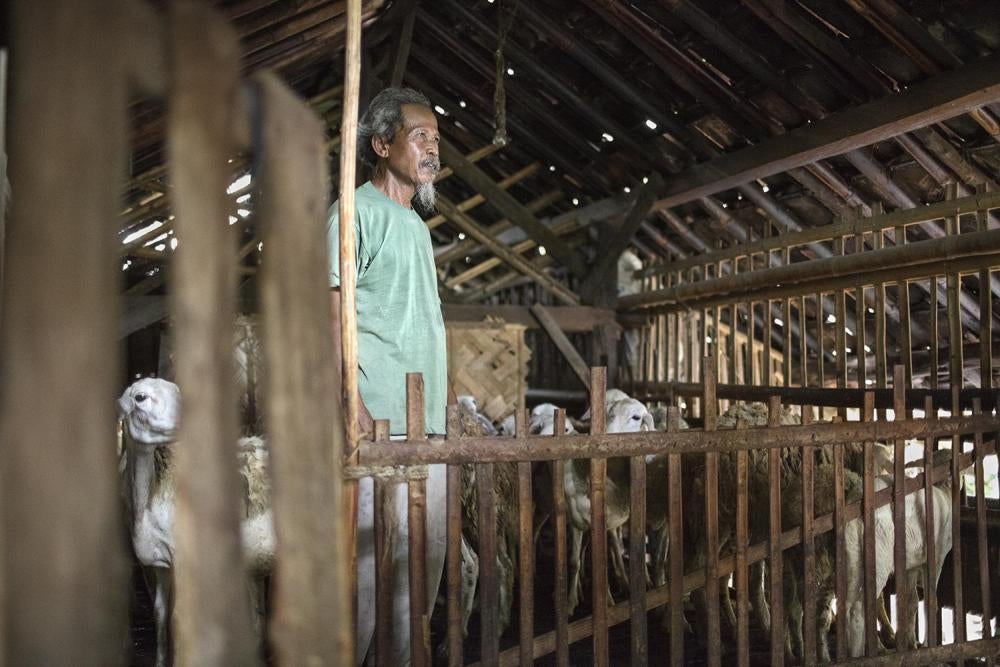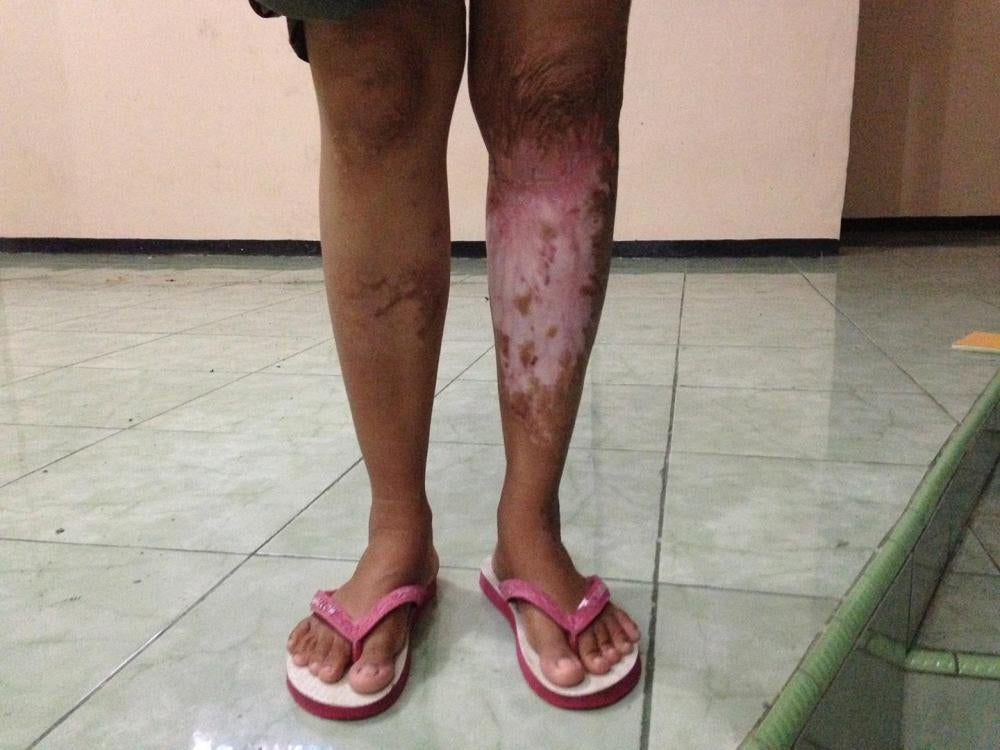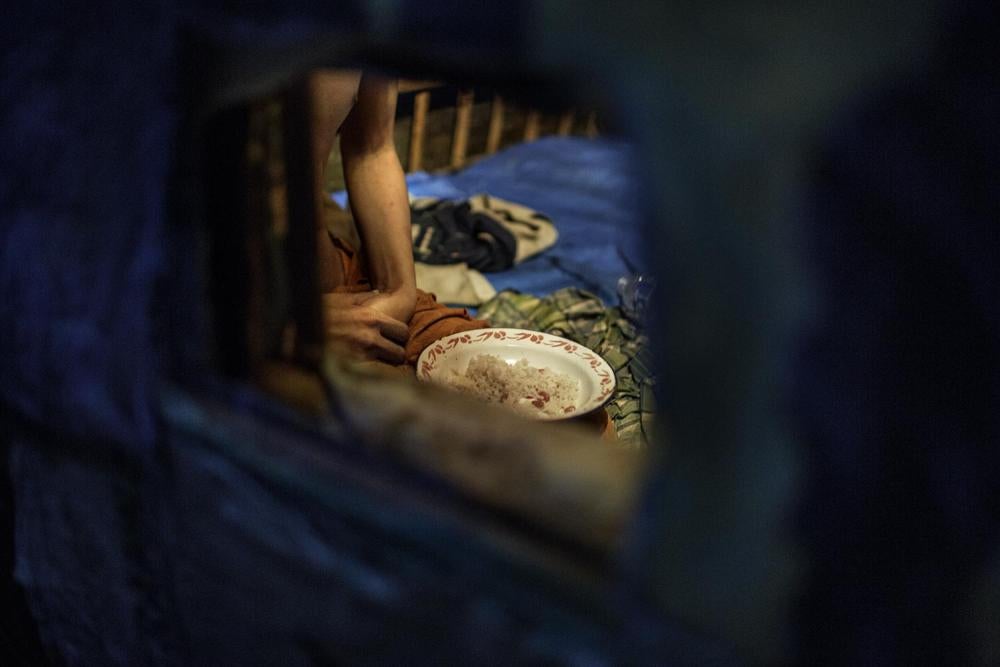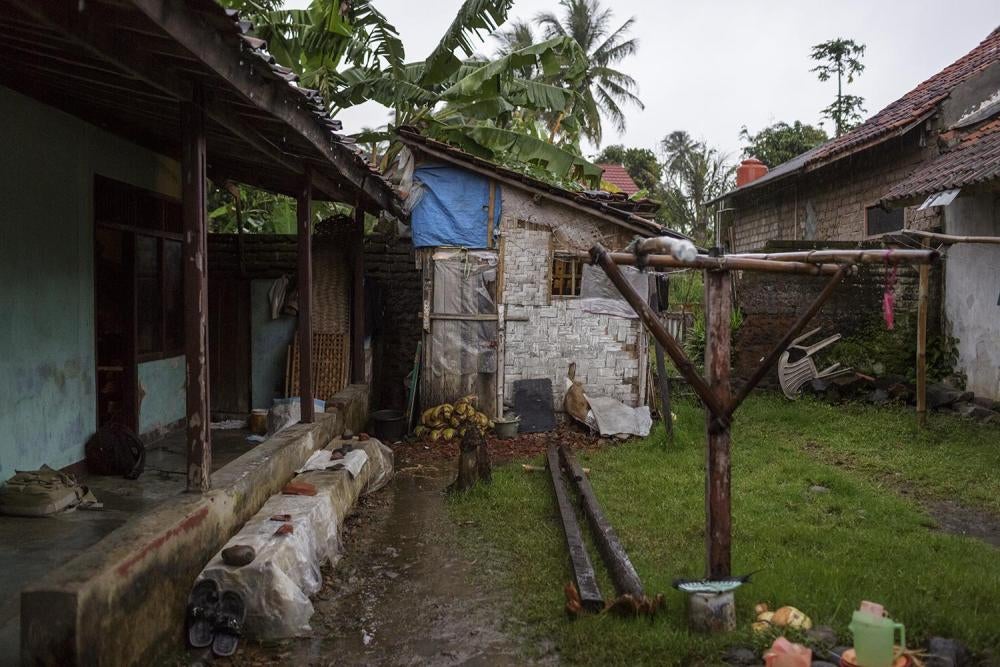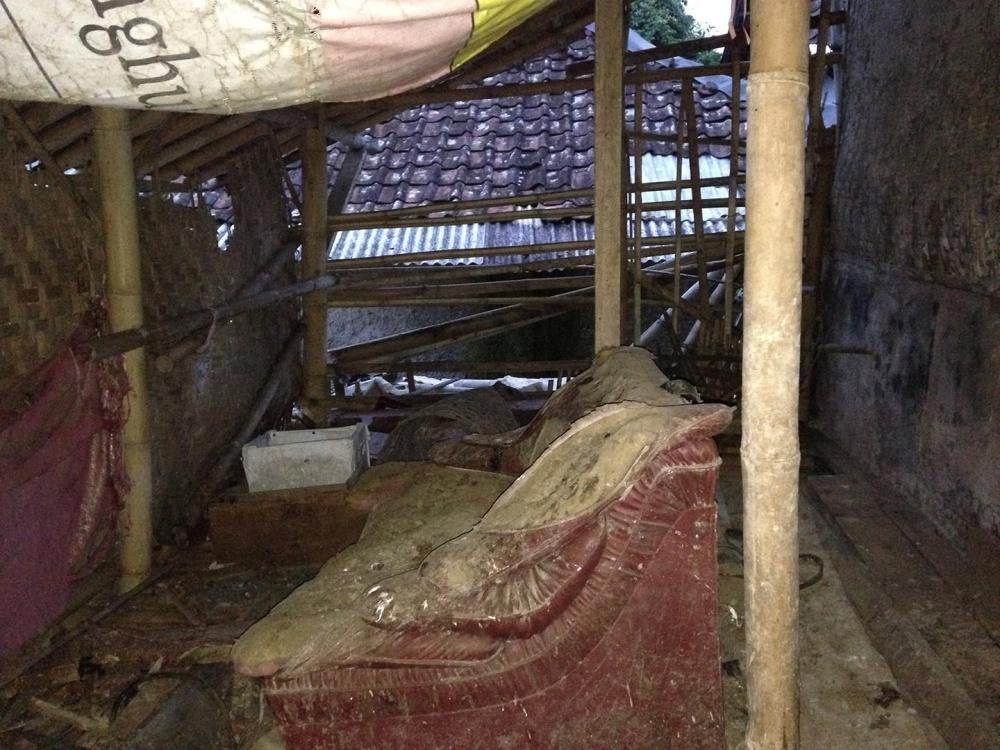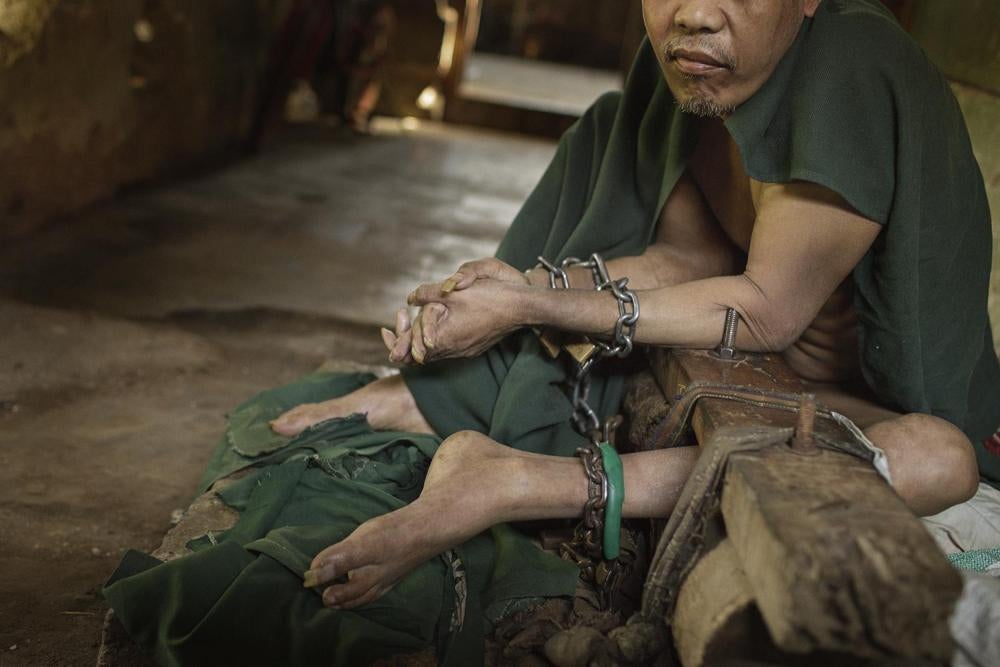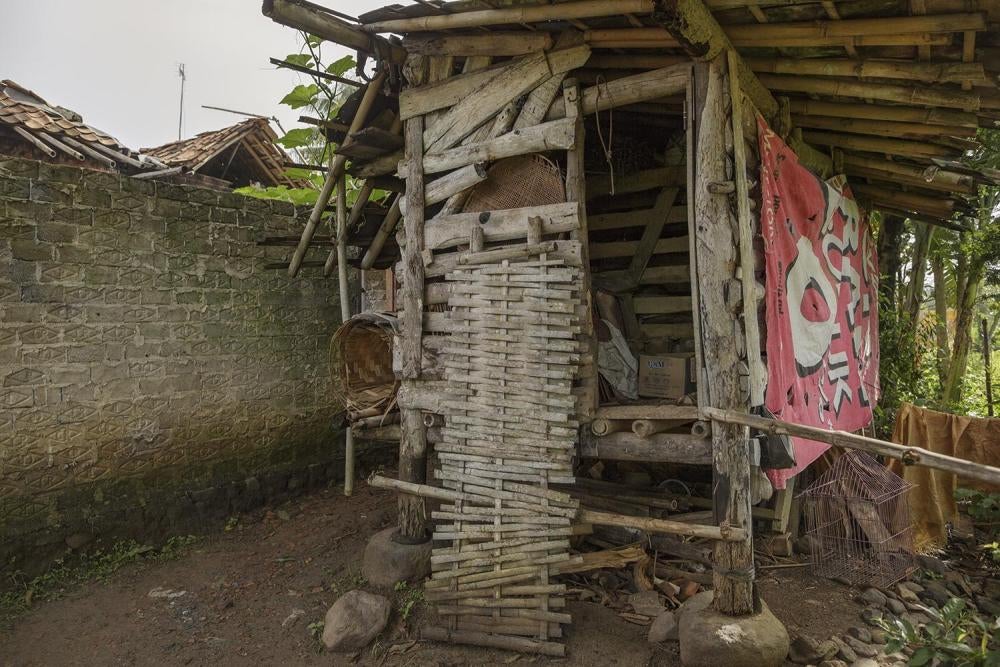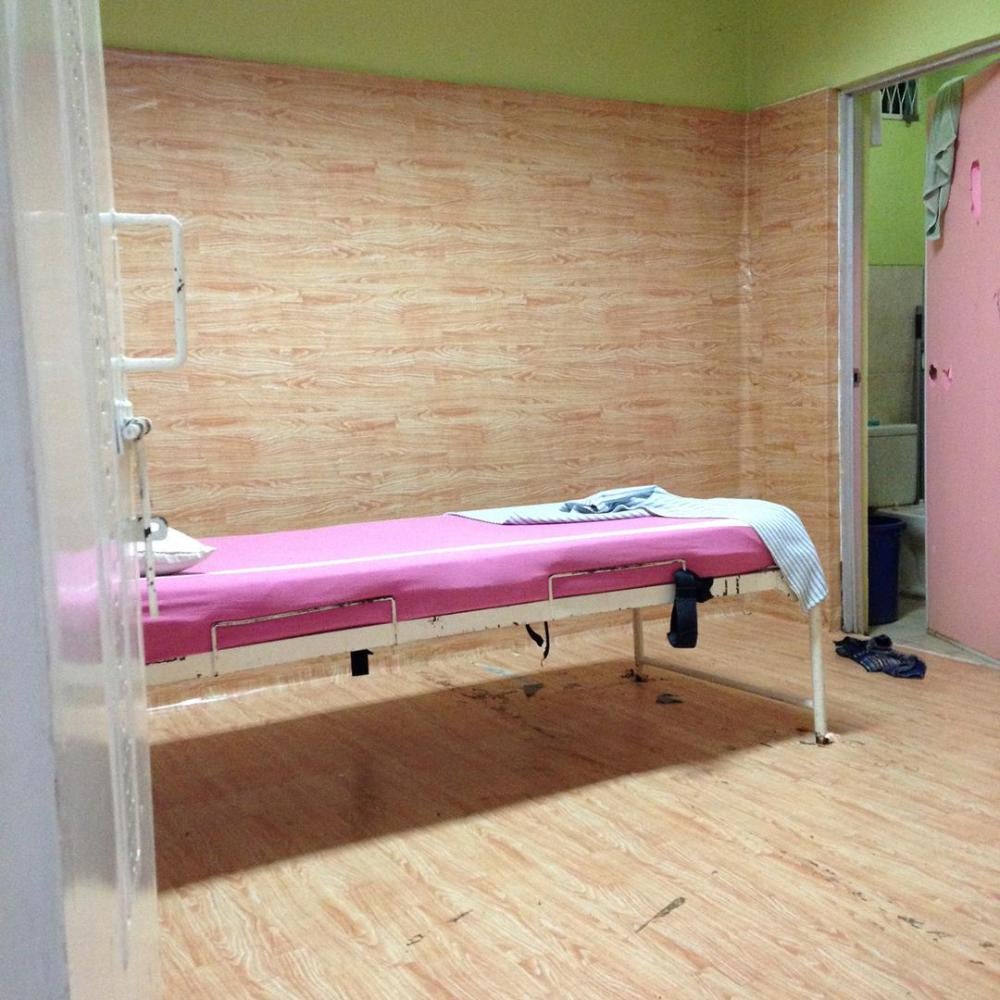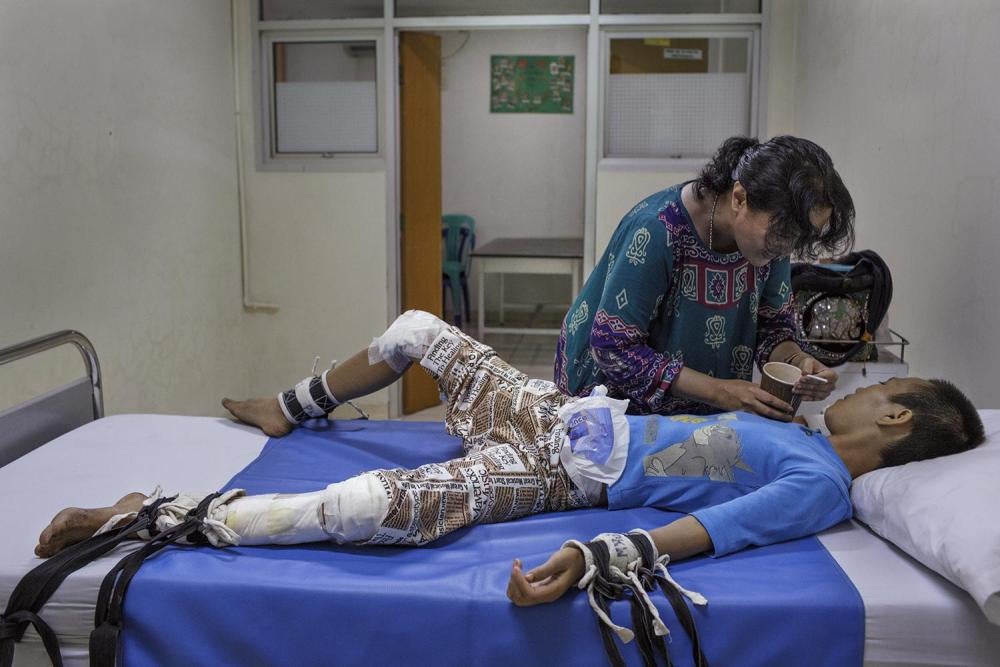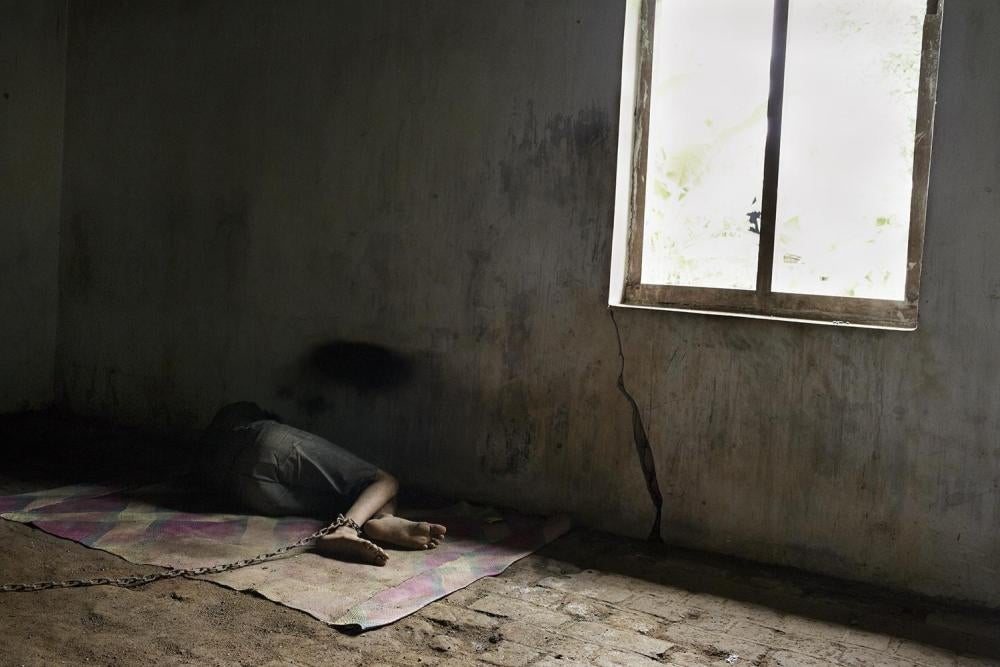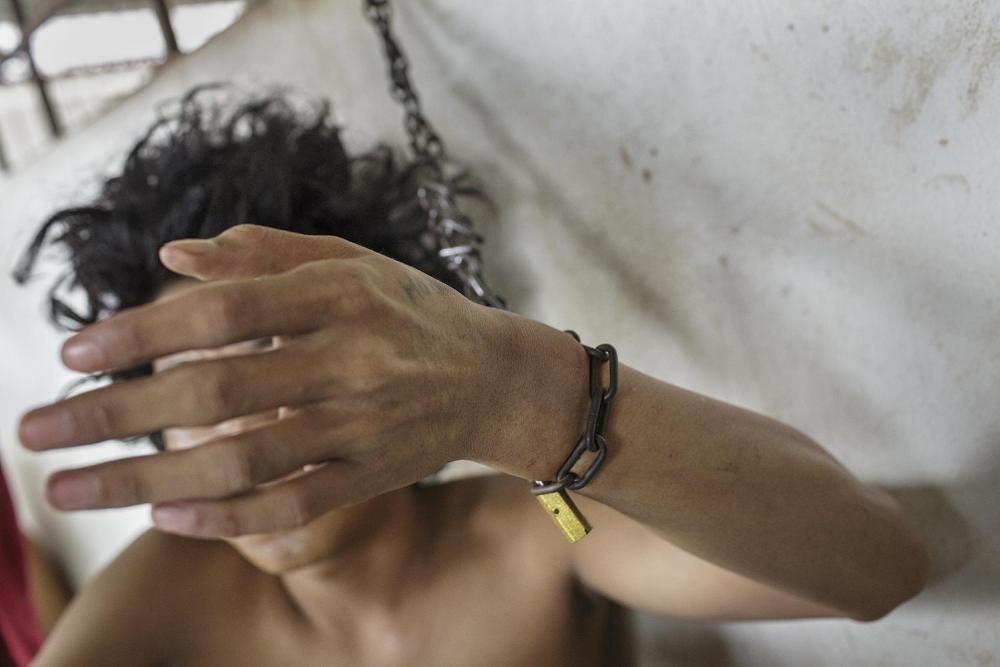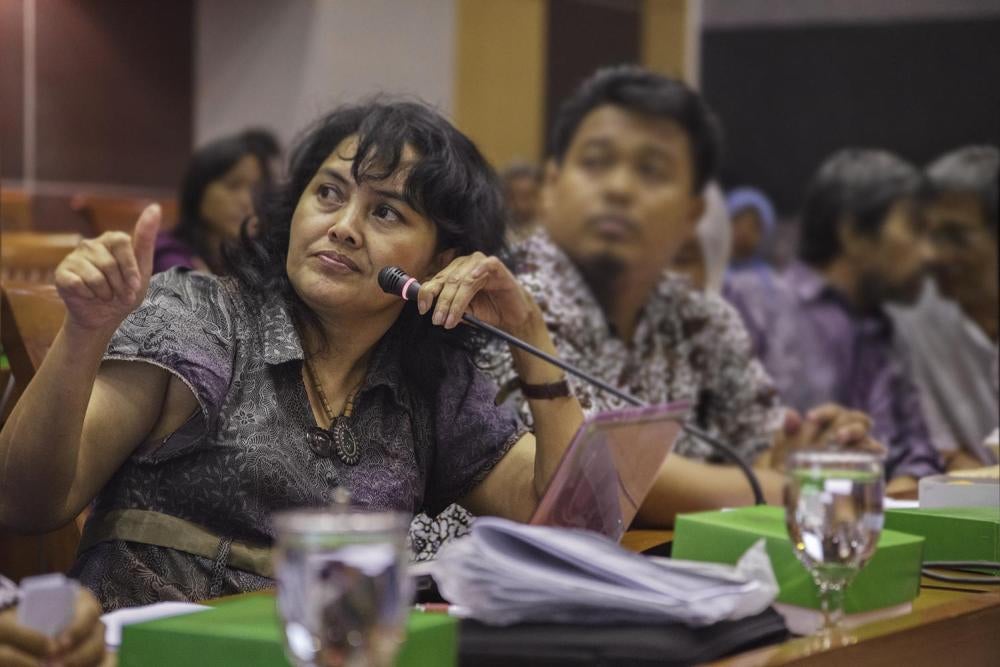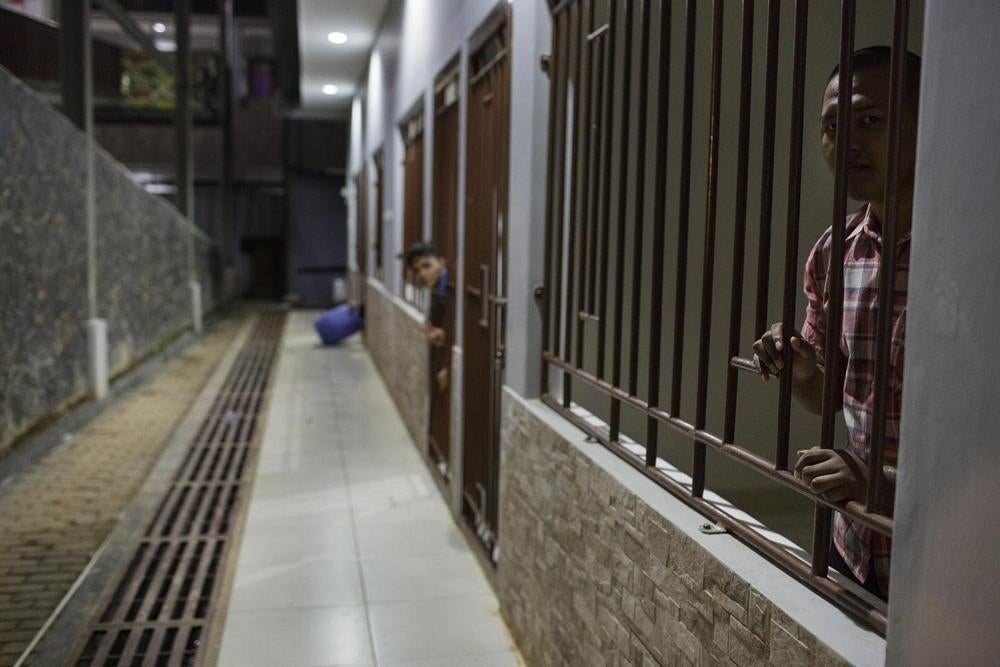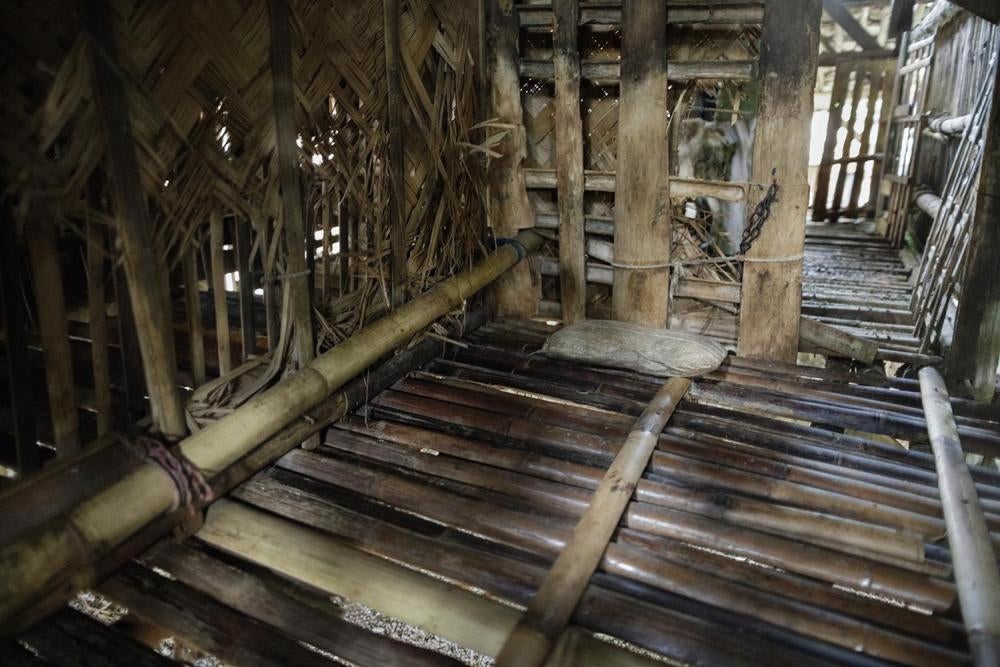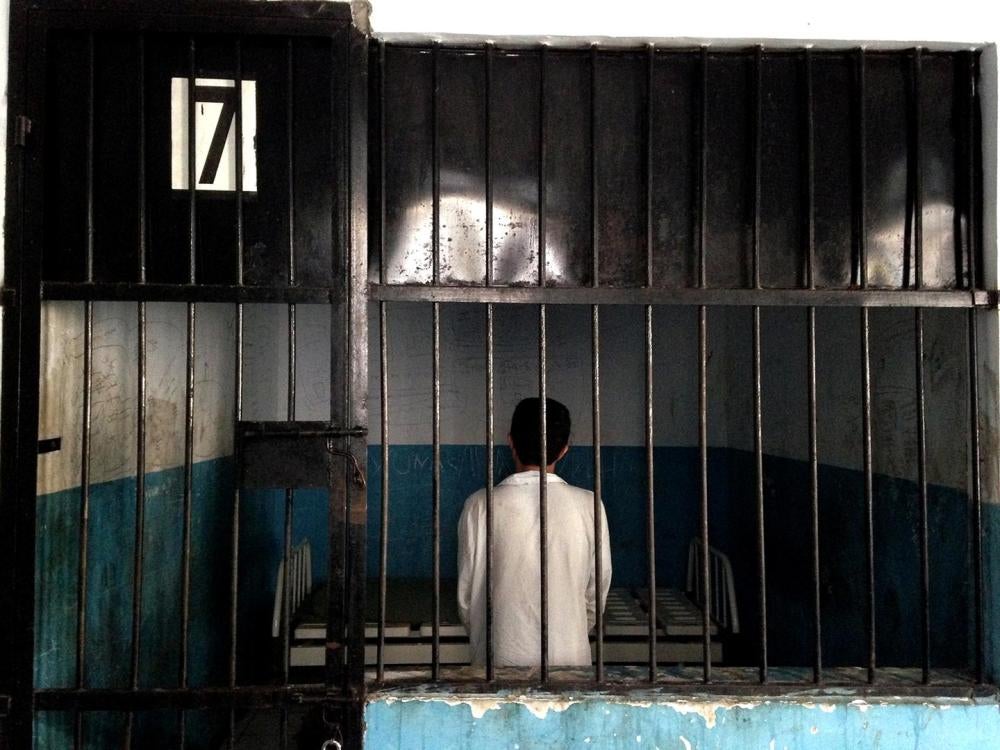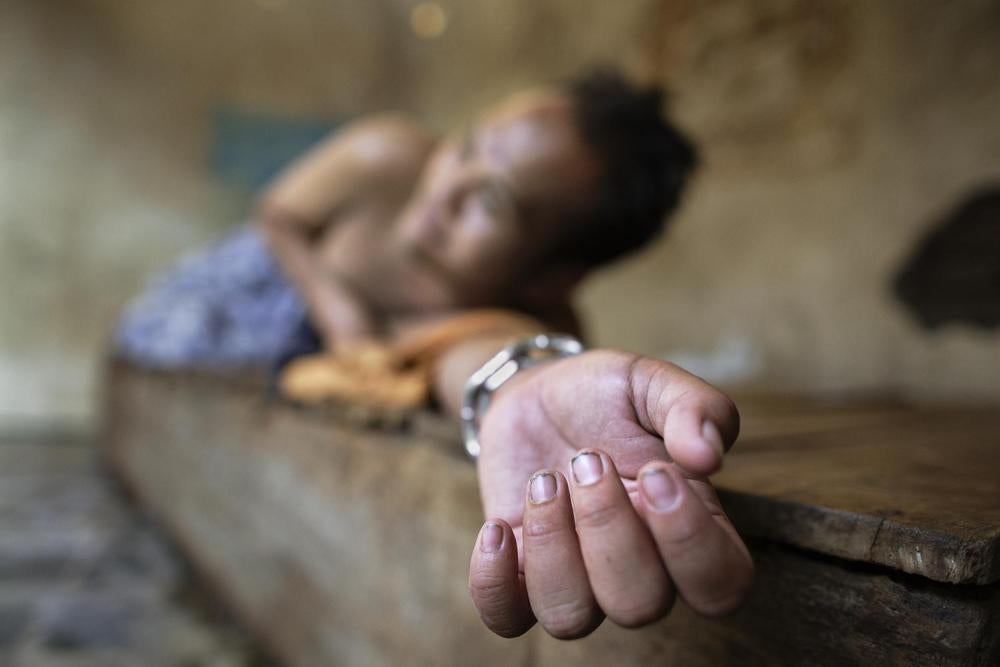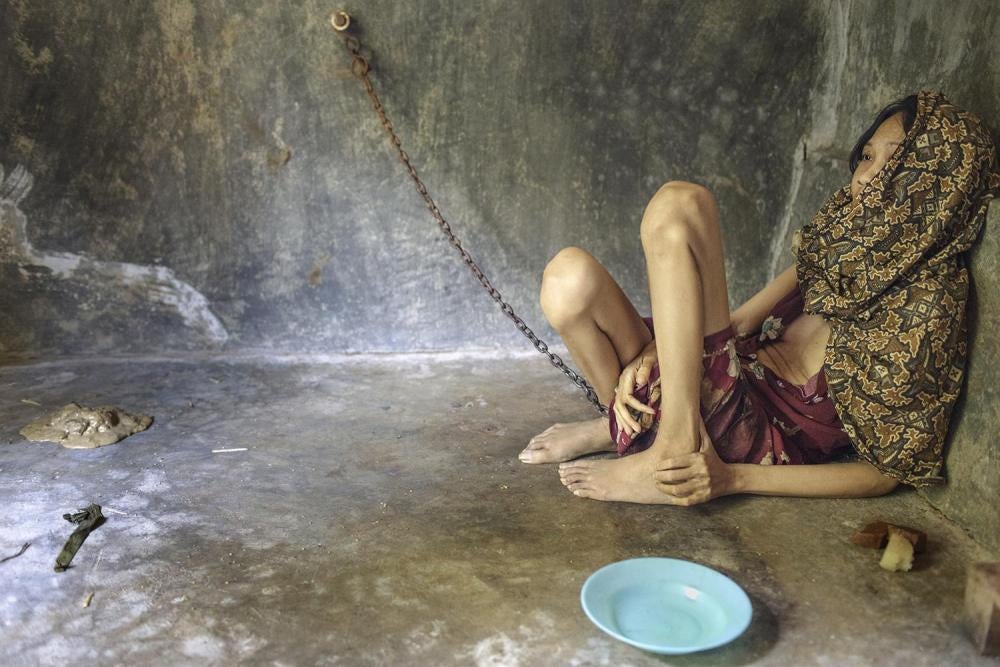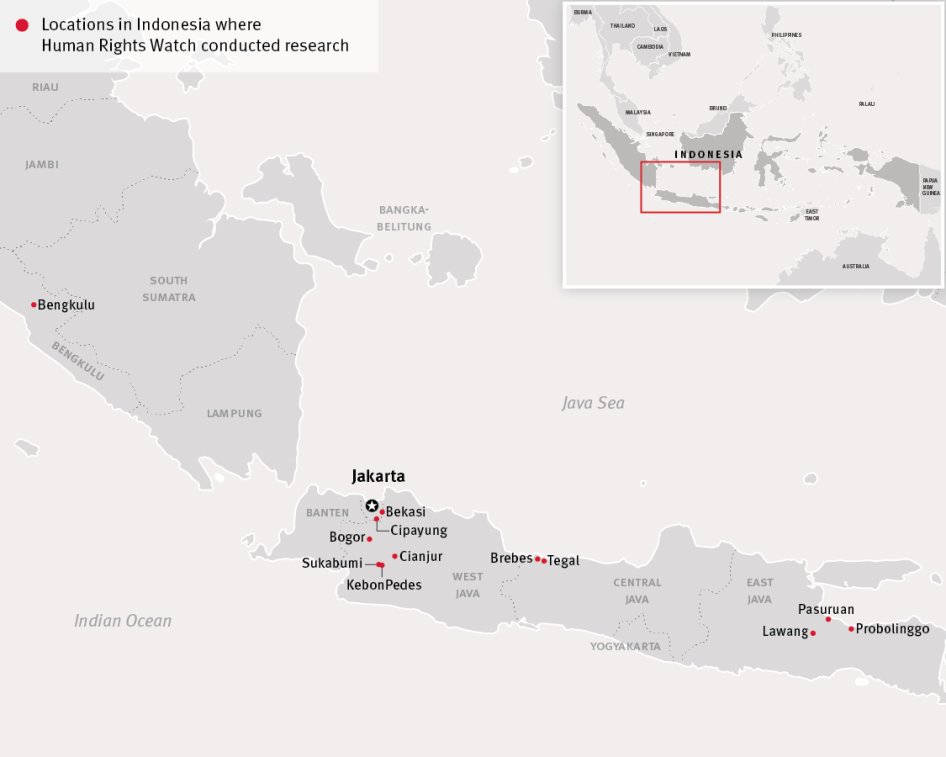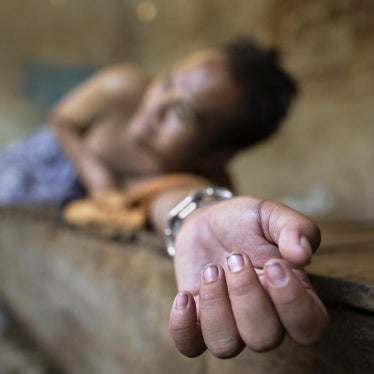Summary
I used to be tied up at home with a plastic rope. My heart broke when they chained me…. I was chained when I first came [to Galuh]. I get chained often—at least 10 times since I have come because I fought with the others. It can last for one day to a week. I had to go to the toilet on the spot, in the drain in the room. The staff slaps and hit me often, already three times because I peed and got angry. Tell the government, I want to go home.
Rafi, a 29-year-old man with a mental health condition, Yayasan Galuh Rehabilitation Center in Bekasi, August 2015
Imagine living in hell, it's like that here.
Asmirah, a 22-year-old woman with a psychosocial disability at a religious healing center in Brebes, August 2015
Carika is a 29-year-old woman with a psychosocial disability who lives in a village in Central Java, Indonesia, where she sells rice and tempeh (fermented soy bean cakes) at a roadside stall.
It is a remarkable change for a woman who until about five years ago was locked in a cramped and filthy goat shed, barely able to stand or move around, and forced to eat, sleep, and defecate amid the nauseating stench of goat droppings. Her family—struggling to cope and unable to access mental health care and support services—kept her there for four years, resisting her desperate calls to be let out. They finally did so when Carika’s situation received press attention.
Carika is just one of 57,000 people with real or perceived psychosocial disabilities (mental health conditions) in Indonesia who have been in pasung—shackled or locked up in confined spaces—at least once in their lives. Latest available government data suggests that 18,800 people currently live in pasung in Indonesia.
Although the government banned pasung in 1977, families and traditional and religious healers continue to shackle people with psychosocial disabilities.
This report examines the abuses—including pasung—that persons with psychosocial disabilities face in the community, mental hospitals, and various other institutions in Indonesia, including stigma, arbitrary and prolonged detention, involuntary treatment, and physical and sexual violence. It also examines the government’s shortcomings in addressing these problems.
Based on research across the Indonesian islands of Java and Sumatra, Human Rights Watch documented 175 cases of persons with psychosocial disabilities in pasung or who were recently rescued from pasung. We also obtained information about another 200 cases documented in recent years. The longest case of pasung that Human Rights Watch documented was a woman who was locked in a room for nearly 15 years. The Indonesian Ministry of Health has recognized pasung as an “inhuman” and “discriminatory” treatment of persons with mental health conditions. The government has launched many programs and initiatives to promote mental health and put an end to pasung, including a program called “Indonesia Free from Pasung 2014.” However, due to the lack of understanding and awareness around mental health and the dearth of community-based voluntary services, the practice continues.
Across Indonesia, there is a widespread belief that mental health conditions are the result of possession by evil spirits or the devil, having sinned, displayed immoral behavior, or lacking faith. As a result, families typically first consult faith or traditional healers and often only seek medical advice as a last resort.
Even if they do look for access to medication, however, people may find it impossible to access it. Ministry of Health data shows that nearly 90 percent of those who may want to access mental health services cannot. The country of 250 million people has only 48 mental hospitals, more than half of them located in just four provinces of Indonesia’s 34 provinces. Eight provinces have no such hospitals, and three have no psychiatrists. In all of Indonesia there are just 600 to 800 psychiatrists—or one trained psychiatrist per 300,000 to 400,000 people. The few facilities and services that exist often do not respect the basic rights of people with psychosocial disabilities and contribute to the abuses against them.
Under Indonesian law it is relatively easy to involuntarily admit a person with a psychosocial disability to an institution. The Mental Health Act (2014) allows a family member or guardian to admit a child or an adult with a psychosocial disability without their consent to a mental health or a social care institution, and without any judicial review. Human Rights Watch found 65 cases of people arbitrarily detained in mental hospitals, social care institutions, and NGO-run or traditional or religious centers. None of those with psychosocial disabilities interviewed by Human Rights Watch who were living in institutions said that they were there voluntarily.
At some institutions, Human Rights Watch documented cases where families had left fake phone numbers and addresses on admission forms in order to abandon the relative, in other cases they simply moved to a new home or failed to show up. The longest case of prolonged detention that Human Rights Watch documented was seven years at a social care institution and 30 years at a mental hospital.
In traditional or religious healing centers, there is no mental health care available and the basis for admission and discharge is left entirely to the discretion of the faith healer.
Haji Hamdan Saiful Bahri, an Islamic faith healer who runs Kampung ChiRanjang, a private healing center in Cianjur, described how he diagnosed a 13-year-old boy before admitting him to his institution for so-called religious treatment. “I touched his chest, head, and legs to do photo sonogram [X-ray] to find out his illness,” Bahri said. “He started screaming so I knew he was depressed.” The process for discharge was similarly arbitrary. “When the [body] heat becomes cold, they’re ready to leave,” Bahri said. “When I take them outside to the market or to play football and the person feels cold, it means they’re cured.”
Human Rights Watch found that in seven private institutions, healing centers and pantis (government social care institutions) visited, persons with psychosocial disabilities lived in severely overcrowded and unsanitary conditions. In Panti Laras 2, a social care institution on the outskirts of the capital, Jakarta, approximately 90 women live in a room that can reasonably accommodate no more than 30. There was no space to walk; to enter the room one had to physically tiptoe over the hands and feet of the women crowded together on the floor. Overcrowding contributes to a high prevalence of lice and scabies. Healing centers are similarly overcrowded as they are small, often dilapidated, and traditionally built as part of the healer’s home.
In the traditional or religious healing centers, personal hygiene is a serious problem as people are chained and do not have access to a toilet. As a result, they urinate, defecate, eat, and sleep in a radius of no more than one to two meters.
In 13 of the 16 institutions that Human Rights Watch visited, persons with psychosocial disabilities, including children, were routinely forced to take medication or subjected to alternative “treatments” such as concoctions of “magical” herbs, vigorous massages by traditional healers, Quranic recitation in the person’s ear, and baths. “They call my name, put medicine in my hand and ask me to drink it…. They don’t allow me to refuse,” Wuri, a woman with a psychosocial disability living in a rehabilitation center, said. They make me swallow the medicine and if I don’t drink it, they put me in the isolation room.”
In addition to oral and injectable medication, Human Rights Watch found in four mental hospitals visited that patients were given Electroconvulsive therapy (ECT) without consent. In three of the hospitals, ECT was administered in its “unmodified” form (without anesthesia, muscle relaxants and oxygen) because of a shortage of trained anesthesiologists to administer the pre-medication, lack of modern ECT machines, or because the modified treatment is simply too expensive for patients to afford.
In addition, Human Rights Watch found that forced seclusion is routine basis in mental hospitals and social care institutions in Indonesia. We documented 22 cases of forced seclusion for durations ranging from a few hours to over a month. Staff and residents in all of the social care institutions and rehabilitation centers visited explained that persons with psychosocial disabilities were put in forced seclusion as a form of punishment or to discipline them—for example, for failing to follow orders, trying to escape, getting into a fight, or becoming intimate with other residents.
Persons with psychosocial disabilities experience physical abuse if they try to run away from institutions or do not obey the staff. Human Rights Watch documented 25 cases of physical violence and 6 cases of sexual violence by staff and residents against persons with psychosocial disabilities in the community, mental hospitals, social care institutions, and healing centers.
In about half of the hospitals, institutions, and healing centers visited by Human Rights Watch, male staff would enter and exit women’s wards or sections at will or were responsible for the women’s section, including at night, putting women and girls at high risk of sexual harassment and violence. In healing centers in particular, men and women are chained next to each other. “When I take a shower, the men, the staff watch me,” said Tasya, a woman with a psychosocial disability living in a healing center in Brebes. “One male staff member touched my vagina this morning. He was doing it just for fun.” Human Rights Watch found no evidence of staff being reprimanded or facing legal action for physical or sexual violence.
In 2011, Indonesia ratified the Convention on the Rights of Persons with Disabilities (CRPD), guaranteeing equal rights for all persons with disabilities including the right to liberty and security of the person, and freedom from torture and mistreatment. Three years later, parliament passed the Mental Health Act (MHA), partly to address the dire mental health situation and abuses against persons with psychosocial disabilities, including shackling.
Despite the important advances, the MHA contains some potentially problematic provisions. It continues to allow persons with psychosocial disabilities to be stripped of their legal capacity—the right to make one’s own decisions, including about one’s own medical care. The draft Rights of Persons with Disabilities Bill that is currently pending in parliament is an attempt by the government to provide equal rights and opportunities for persons with disabilities, including by ensuring equal access to education and making the country accessible, though it too fails to guarantee legal capacity.
Human Rights Watch calls on the Indonesian government to:
- Amend the Mental Health Act and Rights of Persons with Disabilities Bill to ensure that they are in full compliance with the CRPD.
- Ensure rigorous monitoring and implement policies, including the ban on pasung, to prevent and redress abuses against persons with psychosocial disabilities.
- Train and sensitize government health workers, mental health professionals, and staff in institutions to the concerns and needs of persons with psychosocial disabilities, and create a confidential and effective complaint mechanism for individuals with psychosocial disabilities to report abuse.
- Progressively develop adequate and accessible voluntary community-based mental health and support services.
- Work with international donors on programs and appropriate services, with donors providing technical assistance to such community-based services.
As Dr. Pandu Setiawan, chairman of Indonesian Mental Health Networks and former director of mental health, told Human Rights Watch: “The government needs to make mental health a priority because it’s a human right. Human rights for mental [health] patients should be the same as for anyone else.”
Recommendations
To the Indonesian Parliament
- Amend or repeal all domestic legislation that is contrary to the CRPD to ensure that persons with psychosocial or intellectual disabilities are guaranteed legal capacity, equal recognition before the law, supported decision-making as opposed to guardianship (plenary and limited), freedom from discrimination, and protection from involuntary detention and treatment.
- Amend the Mental Health Act so as to:
- Recognize the legal capacity of all persons with disabilities on an equal basis with others and the right to exercise it. Remove clauses that allow for plenary or limited guardianship. Instead provide accommodations and access to support where necessary to exercise legal capacity.
- Ban all forms of involuntary treatment, including electroconvulsive (ECT) therapy, without the person’s free and informed consent. Explicitly prohibit the use of seclusion and prolonged restraint. Define exceptional circumstances in which a patient may be considered temporarily unable to give free and informed consent and in such circumstances,immediate medical treatment may be administered as it would be to any other patient without a disability incapable of consenting to treatment at that moment, provided that the treatment is strictly necessary to address a life-threatening condition or a condition of similar gravity.
- Require admission to public or private mental health institutions to be voluntary, based on free and informed consent of the person concerned.
- Require that any detention on a non-voluntary basis be possible only following a determination by an independent judicial authority, meeting due process, that is based on behavior that poses imminent actual harm to self or others and not on the basis of the existence of a disability; on an equal basis with others; it should be limited to short periods of time as specified by law, and subject to continual full judicial review.
- Remove clauses that allow for mandatory mental health evaluations.
- Mandate a shift from institutional care to providing access to voluntary community-based mental health and other support services for persons with psychosocial disabilities and their families where necessary.
- Amend the Rights of Persons with Disabilities Bill to:
- Recognize the legal capacity of all persons with disabilities on an equal basis with others and the right to exercise it. Remove clauses that allow for plenary or limited guardianship. Instead provide accommodations and access to support where necessary to exercise legal capacity.
- Adopt a twin-track approach to including women and girls in disabilities: dedicating specific provisions to their protection and well-being as well as including them in general provisions.
To the Ministry of Health, Directorate of Mental Health; Provincial Departments of Health; District Health Offices
For Mental Hospitals
- Immediately improve conditions in mental hospitals to ensure the human rights of persons with psychosocial disabilities are respected by:
- Ensuring mental hospitals review all cases of persons who are currently living in mental hospitals and release those who are detained against their will. As far as possible, provide access to an alternative community-based independent living option that is based on the autonomy, will, and preference of the individual.
- Requiring admission to public or private mental health institutions be voluntary, based on free and informed consent of the person concerned.
- Banning all forms of involuntary treatment, including electroconvulsive therapy, without the person’s free and informed consent.
- Prohibiting the use of seclusion.
- Prohibiting the use of prolonged restraint and all restraints as a form of punishment, control, retaliation or as a measure of convenience for staff.
- Training mental health staff on de-escalation techniques. Staff should make every reasonable effort to use alternatives to restraints, including through the use of “cooling off” periods, verbal persuasion, and negotiation strategies to defuse and de-escalate volatile situations.
- Ensuring children are separated from unrelated adults.
- Conduct monitoring visits that are regular, unannounced, and are based on unhindered and confidential interaction with both staff and patients. The ministry should publicly report on the findings of these visits.
- Establish an independent and confidential complaints system that receives and investigates complaints, including ill-treatment of persons with psychosocial disabilities in institutions.
- Require all government hospitals and privately run institutions to provide accessible information to persons with psychosocial disabilities and inform them about their rights and complaint procedures.
- Train all doctors and paramedical staff, including psychiatrists, psychiatric nurses, psychologists and counselors, particularly on free and informed consent.
- Build the capacity of health professionals to identify and manage mental health conditions and support people with psychosocial disabilities by providing training, developing their knowledge of mental health and support techniques, and by including mental health in university curriculums.
For Legal Reform and Policy Implementation
- Strengthen and monitor the implementation of laws banning pasung.
- Recognize involuntary hospitalization based on the existence of a disability as a form of discrimination and without consent of the individual as a form of arbitrary detention.
- Implement the amended Mental Health Act.
For the Promotion of Mental Health Care and Delivery of Services
- Make mental health a priority and provide adequate support to establish, run, and extend access to voluntary community-based mental health care and other support services for persons with psychosocial disabilities.
- Conduct extensive public awareness and information campaigns including through the media, religious groups, and schools on mental health and the ban on shackling.
- Ensure that community-based mental health services work in partnership with persons with psychosocial disabilities, their families, caregivers, and faith healers.
- Take concrete steps to end the inhumane treatment of persons with psychosocial disabilities within their communities, particularly shackling. This should include raising awareness of mental health conditions, the rights of persons with disabilities and alternatives to institutionalization and restraint.
- Ensure every province has mental health professionals and services, including Riau, Banten, North Borneo, Gorontalo, East Nusa Tenggara, West Sulawesi, North Maluku, and West Papua.
- Ensure that adequate mental health medication is available in every puskesmas.
- Systematically integrate mental health into general healthcare services and train primary health providers in every puskesmas to identify and manage common mental health conditions.
- Engage spiritual leaders to challenge discriminatory beliefs and practices related to psychosocial disabilities by raising awareness among them on mental health and sensitizing them to the needs of people with psychosocial disabilities.
For Data Collection
- Conduct a survey, in conjunction with disabled persons’ organizations, of the conditions in all Indonesian mental hospitals for persons with psychosocial or intellectual disabilities.
- Improve quantitative and qualitative data collection on the current number of people living in pasung across Indonesia, the reasons families continue to practice pasung, and the support or services they would require to discontinue the practice.
- In consultation with disabled persons’ organizations, improve census data collection on persons with disabilities to better inform policy decisions.
To the Ministry of Social Affairs; Provincial Departments of Social Affairs; District Social Affairs Offices
For Social Care Institutions, Traditional or Religious Healing Centers
- Urgently improve conditions in mental hospitals to ensure the human rights of persons with psychosocial disabilities are respected by:
- Developing guidelines and basic minimum standards for sanitation, hygiene, and living conditions and prohibiting arbitrary detention, forced treatment, the use of seclusion and restraint in social care institutions as well as traditional and religious healing centers.
- Ensuring access to adequate and appropriate health care, including mental and reproductive services.
- Requiring social care institutions and traditional and religious healing centers to be registered with the Social Affairs Ministry and ensuring they abide by the basic minimum standards for institutions. Shut down and/or hold accountable centers that fail to meet and respect these standards.
- Requiring admission to all institutions to be voluntary, based on free and informed consent of the person concerned.
- Reviewing all cases of persons who are currently living in social care institutions and traditional and religious healing centers and release those who are detained against their will. For those who are unable to go home to supportive families, provide access to an alternative community-based independent living option that is based on the autonomy, will, and preference of the individual.
- Training staff in social care institutions and traditional or religious healing centers on de-escalation techniques. Staff should make every reasonable effort to use alternatives to restraints, including through the use of “cooling off” periods, verbal persuasion, and negotiation strategies to defuse and de-escalate volatile situations.
- Ensuring children are separated from unrelated adults.
- Reduce overcrowding in institutions, particularly Panti Laras 2 in Cipayung, by progressively developing voluntary community-based assisted living services and other forms of support to allow persons with psychosocial disabilities to live independently and in the community.
- Conduct extensive public awareness and information campaigns including through the media, religious groups, and schools on mental health and the ban on shackling.
- Ensure that children with psychosocial disabilities have access to inclusive public education.
- Conduct monitoring visits that are regular, unannounced, and are based on unhindered and confidential interaction with both staff and patients. Publicly report on the findings of these visits.
- Establish an independent and confidential complaints system that receives and investigates complaints, including ill-treatment of persons with psychosocial disabilities in institutions.
For Legal Reform and Policy Implementation
- Create and implement a de-institutionalization policy and a time-bound action plan for de-institutionalization, based on the values of equality, independence, and inclusion for persons with disabilities. Ensure that this plan does not aim to transform existing institutions but is targeted towards progressively closing them down and developing a wide range of community-based alternatives that are rooted in the will and preference of the individual with a disability. Make sure that preventing institutionalization is an important part of this plan and that persons with disabilities, DPOs, and NGOs working on deinstitutionalization are provided opportunities to participate in the formation of this plan. When appropriate, seek out the experiences of other countries that have fully undergone deinstitutionalization.
- Recognize institutionalization based on disability as a form of discrimination and institutionalization without consent of the individual as a form of arbitrary detention.
For the Promotion of Mental Health Care and Delivery of Services
- Develop a time-bound plan to shift progressively to providing access to community-based support services at the district-level for persons with psychosocial disabilities and their families as well as independent living facilities, based on the autonomy, will, and preference of the individual.
- Create specific budget lines for community support programs, independent, and supportive living arrangements for persons with psychosocial disabilities.
- Provide disability-sensitive training to social affairs staff to sensitize them on interacting with persons with disabilities.
- Ensure that social affairs teams in charge of freeing people from pasung adopt a holistic approach that includes sensitizing the family and surrounding community on psychosocial disability and engaging them in the person’s rehabilitation, following up regularly on the situation of the person returned home to ensure they are not put back into pasung, and providing continued access to adequate support and services in the community.
- Develop adequate community-based rehabilitation services in consultation with DPOs, disability experts, and persons with disabilities themselves.
- Ensure that community-based services work in partnership with persons with psychosocial disabilities, their families, caregivers, and faith healers. This should include raising awareness of mental health conditions, the rights of persons with disabilities, and alternatives to institutionalization and restraint.
For Data Collection
- Conduct a survey, in conjunction with DPOs, of the conditions in all social care institutions and traditional and religious healing centers.
- In consultation with DPOs, improve census data collection on persons with disabilities to better inform policy decisions.
To the Management of Mental Hospitals and Social Care Institutions
- As a matter of urgency, improve infrastructure, particularly in pantis, including by providing adequate toilets, sufficient supply of water, food, lice medicine, soap, sanitary napkins, clothes, and footwear.
- Comply with the basic minimum standards set by the Ministries of Health and Social Affairs. Hold institutions and their staff accountable if they fail to comply with these standards.
- Create an appropriate and confidential mechanism to report abuse and facilitate redress through judicial means.
- Train all staff to be sensitive and responsive to the needs of persons with psychosocial disabilities including de-escalation techniques.
- Immediately provide appropriate and adequate activities and access to education within institutions, in consultation with DPOs and NGOs. Develop creative techniques to motivate residents to learn skills.
- Sensitize families to the needs and rights of persons with psychosocial disabilities and involve them in caring for relatives. After the person goes home, follow up with the family to ensure they are not put into pasung and have access to community-based mental health and other support services.
To the National Human Rights Commission
- Ensure regular and periodic monitoring of conditions in mental hospitals and social care institutions for persons with psychosocial disabilities. The investigating team should be independent and not include management from these institutions.
- Ensure the NHRC’s special rapporteur on the rights of persons with disabilities has adequate resources to investigate abuses against persons with disabilities.
- Establish accessible and confidential complaint mechanisms for persons with psychosocial disabilities.
To Indonesia’s Development Partners, including the US, EU, Australia, Japan, the Asian Development Bank, the World Bank, AusAid, USAID and UN Agencies
- Encourage the government of Indonesia to respect its international obligations under the CRPD, particularly its principles of equality, non-discrimination, independence, and inclusion.
- Support the government of Indonesia, DPOs and other NGOs by providing support and technical assistance to implement the ban on shackling and safeguard and raise awareness of the rights of persons with psychosocial disabilities.
- Earmark assistance toward community-based mental health and support services, and seek to strengthen a community-based model instead of creating new or refurbished mental health institutions.
Terms
Child: The word “child,” “boy,” or “girl” in this report refers to anyone under the age of 18. The Convention on the Rights of the Child states that under the convention, “a child means every human being below the age of eighteen years unless under the law applicable to the child, majority is attained earlier.”[1] Although Indonesian law offers inconsistent definitions for majority, Indonesia's Child Protection Act also defines a child as being a person under the age of 18.
Disabled Persons’ Organizations (DPOs): Organizations in which persons with disabilities constitute the majority of members and the governing body and that work to promote self-representation, participation, equality, and integration of persons with disabilities.[2]
Electroconvulsive therapy (ECT): A psychiatric shock therapy that consists of placing electrodes on the patient’s head and passing electricity through the brain to stimulate an artificial seizure. ECT is generally prescribed for severe depression, mania, schizophrenia, and other mental health conditions when other treatment has failed to work or for quicker results. In its modified form, ECT is administered under general anesthesia, with muscle relaxants, and oxygenation and can result in headaches as well as short-term memory loss.[3] Unmodified ECT (without anesthesia or muscle relaxants) continues to be practiced in Indonesia and in other countries in settings with poor access to modern ECT equipment, anesthesia or anesthetists, or where the cost of ECT with anesthesia is prohibitively high. The risks of unmodified ECT include dental damage, spinal and pelvic fractures, and muscle injuries.[4] A typical course of ECT involves six to twelve sessions given two to three times a week.[5]
Institutions: Refers to state-run (unless specified otherwise) mental hospitals, government social care or nongovernmental organization-run residential facilities. Traditional or religious healing centers are also types of rudimentary institutions.
Intellectual disability: A condition characterized by significant limitations both in intellectual functioning (reasoning, learning, problem solving) and in adaptive behavior, which covers a range of everyday social and practical skills. Intellectual disability forms a subset within the larger universe of developmental disability, but the boundaries are often blurred as many individuals fall into both categories to differing degrees and for different reasons.[6] Examples of intellectual disability include Down Syndrome and some forms of cerebral palsy.
Legal capacity: The right of an individual to make their own choices about their life.[7] The concept of legal capacity encompasses the right to personhood, being recognized as a person before the law, and legal agency, the capacity to act and exercise those rights.[8]
Mental hospital: Refers to government hospitals (unless otherwise specified) that specifically treat persons with mental health conditions.
Panti: Refers to a social care institution run by Indonesia’s Social Affairs Ministry, department or office. Some pantis cater specifically to persons with psychosocial disabilities. Family members, the police, and mental hospitals are empowered to forcibly place persons with psychosocial disabilities in a panti.
Pasung: Literally means “tie” or “bind” in Indonesian and is a form of restraint traditionally used in Indonesia, in the absence of access to mental healthcare and other support services, to confine persons with perceived or actual psychosocial disabilities within the home or just outside. It consists of chaining people or locking them in a room, shed, cage or animal shelter (including chicken coops, pig pens, or goat sheds) for periods of time ranging from a couple of hours or days to years. Pasung can also be a temporary measure that is used to restrain a person with a psychosocial disability for shorter periods of time while the family goes out to work or when the person is having a crisis. Pasung is typically practiced by families who believe that the relative with the psychosocial disability is possessed by evil spirits, or are worried that the person might hurt themselves or others, or might run away. It is also used in traditional or religious healing centers in Indonesia as a form of restraint, punishment, or “treatment.” In a hospital setting, forms of physical restraint would not usually be called pasung because it would technically be used for shorter periods of time, in conjunction with oral or injectable medication, and under the supervision of a psychiatrist.
Psychosocial disability: The preferred term to describe persons with mental health conditions such as depression, bipolar, schizophrenia, and catatonia. This term expresses the interaction between psychological differences and social or cultural limits for behavior, as well as the stigma that the society attaches to persons with mental impairments.[9]
Puskesmas: Commonly used Indonesian short form for Pusat Kesehatan Masyrakat which means Community Health Center. Puskesmas refers to the community health centers at the sub-district-level in Indonesia that provide primary health services. Indonesia has over 9,500 puskesmas.
Shackling: Traditionally defined as the practice of confining a person’s arms or legs using a manacle or fetter to restrict their movement. However, for the purpose of this report, shackling is used in a broader sense to refer to the practice of confining a person with a psychosocial disability using chains, locking them in a room, a shed, a cage or an animal shelter. The words pasung and shackling are used interchangeably in the report.
Traditional or religious healing centers: Refers to centers, generally run by traditional or faith healers who practice “healing” techniques including chaining, Quranic recitation, night baths, herbal concoctions and rubbing the body with stones. Often an extension of the faith healer’s house or situated within the compound, these rudimentary centers primarily cater to people with mental health conditions who are believed to be possessed by evil spirits or the devil, have sinned, displayed immoral behavior, or are thought to have lack of faith (kurang iman). Typically people in these centers have been forcibly placed there by their families or by local policemen.
Traditional or religious healers: Traditional healers in Indonesia who are versed in magic or dealing with spirits are usually referred to as paranormal or dukun. Islamic faith healers in Indonesia who use Quranic recitations as a treatment method are known as ustad or kiai. While there are Christian faith healers and healing centers in Indonesia, there is no specific terminology to describe them.
Methodology
This report is based on six weeks of field research in Indonesia conducted between November 2014 and January 2016.
Human Rights Watch focused its research on a few areas that to some extent represent the diversity of the mental health landscape of the country. We chose to conduct the bulk of the research in Java, as it is a highly urbanized and densely populated island, home to nearly 60 percent of the Indonesian population and the vast majority of mental healthcare facilities, professionals, and support services.
We conducted research in Jakarta, Bekasi, Cipayung, Bogor, Cianjur, Sukabumi, and Kebon Pedes in West Java; in Brebes and Tegal in Central Java; and in Pasuruan, Probolinggo and Lawang in East Java. As a comparison, we also did research in Bengkulu in Sumatra, a more rural region with less developed mental healthcare facilities and services.
However, the cases investigated nonetheless shed light on the situation in other parts of the country as the people we interviewed often came from elsewhere in Indonesia to access services in Java. Although the field research was primarily conducted in Java and Sumatra, we have included relevant data and information from other islands to illustrate that persons with psychosocial disabilities experience shackling and other abuses across the country. While we found a few cases of shackling of individuals with developmental or intellectual disabilities, we have chosen to limit the scope of the report to persons with psychosocial disabilities.
We visited six mental hospitals and general hospitals with psychiatric beds, four government-run social care institutions, six private institutions run by faith healers or nongovernmental organizations, three community health centers and two day care facilities. Human Rights Watch chose the institutions based on geographic diversity, type (district, provincial, or regional general or mental hospital, government, NGO or privately run institutions), and suggestions by government officials as well as local disabled persons’ organizations (DPOs) and other partners.
Facilities visited include in Java: Grogol Mental Hospital, Duren Sawit Hospital, Pondok Kasih Christian Institution, Rumah Kita Unit Informasi Layanan Social-Tebet (Day Care Center), and Puskesmas-Tebet (Community Health Center); in Cipayung:, Panti Laras 2 (Social Care Institution); in Bekasi: Yayasan Galuh Rehabilitation Center; in Bogor: Bogor Mental Hospital; in Cianjur: Kampung ChiRanjang Institution and Yadaka Institution; in Brebes: Rumah Kita Unit Informasi Layanan Social-Kebon Pedes (Day Care Center), Phala Martha Sukabumi Rehabilitation Center, Brebes District General Hospital, Puskesmas Sitanggal (Community Health Center), Samyul Institution and Yayasan Bina Lestari Institution; in Lawang: Lawang Mental Hospital; in Pasuruan: Panti Rehabilitatas Eles Psikotik (Social Care Institution); and in Probolinggo: Puskesmas Bataran. In Sumatra, facilities visited include in Bengkulu: Bengkulu Mental Hospital and Panti Social Bina Laras Dharma Guna (Social Care Institution).
Human Rights Watch was given a tour of each facility, and spoke to residents and staff. Grogol Mental Hospital and Panti Laras 2 allowed us to speak to staff but not to persons with disabilities directly to protect their privacy and for reasons of confidentiality.
Human Rights Watch interviewed a total of 149 people for the report including 72 persons with psychosocial disabilities between the ages of 13 and 69, 10 family members, 14 caregivers or staff working in institutions, 26 psychiatrists, psychologists, nurses and other mental health professionals, 5 faith healers, and 2 lawyers. Human Rights Watch also interviewed 12 government officials, and 8 representatives of local nongovernmental organizations (including DPOs) and disability rights advocates. Of the persons with disabilities interviewed, 28 were men, 39 were women, and 5 were children. Of these, 42 out of 72 had been chained or physically restrained at least once in their lives and a total of 63 were current or former residents of institutions.
In addition to speaking directly to persons with psychosocial disabilities, Human Rights Watch documented 175 cases of people in pasung or who were rescued in recent years from pasung, another 200 such cases reported by the Bengkulu Mental Hospital, and 25 cases of other abuses based on interviews with family members, caregivers, mental health professional, heads of institutions, and disability rights advocates.
It was often not possible to communicate directly with a person who was shackled because they had been isolated, neglected, had not spoken in so many years that they could no longer do so properly, or because the experience was too painful and traumatic to recount.
Human Rights Watch informed interviewees of the purpose of the interview and the manner in which the information would be used. No remuneration or incentives were promised or provided to people interviewed. The interviews were conducted, both in person and on the phone, in English or in Bahasa Indonesia through an interpreter, who was either a disability rights advocate or a human rights activist.
Persons with disabilities were asked for their consent prior to and multiple times during the interview and were informed they could decline to answer questions and end the interview at any time. Interviews were conducted on a voluntary basis, individually (except in cases where the person felt more comfortable being interviewed in a group), and lasted between 20 minutes and three hours. When within institutions, interviews with persons with disabilities were conducted without the presence of staff and out of their hearing range. However, in cases where people were shackled close to each other in institutions and were unable to move to a private location, interviews were conducted in groups or within hearing range of others, with the informed consent of the person. Where the person felt uncomfortable speaking in front of other shackled residents, we did not conduct interviews.
In certain cases, persons with disabilities have been assigned pseudonyms and identifying information, such as location or date of interview, has been withheld in order to respect confidentiality and protect them from reprisals from family or from staff in institutions. In a few cases, names of staff members working at mental health institutions or institutions run by faith healers have also been withheld to protect their identity.
Human Rights Watch made every effort to corroborate claims via media reports; direct observation; medical or psychiatric records; and interviews with family members, other residents, mental health professionals or staff, and disabled persons’ organizations, as well as news articles, where relevant. We also consulted a number of international disability expertsat different stages of the research and writing and reviewed relevant domestic and international media reports, official government documents and reports by government-run mental health facilities or institutions, United Nations documents, World Health Organization publications, NGO reports, and academic articles.
I. Mental Health in Indonesia
According to the 2013 National Basic Health Riskesdas Survey conducted by the Indonesian Ministry of Health, 17 percent of Indonesians have a disability. An estimated 6 percent of the total population, about 19 million people of the total population of 250 million, live with a “mental emotional disorder” or a mental health condition.[10]
The Ministry of Health’s budget is 1.5 percent of Indonesia’s central government expenditure for 2015. Spending on mental health is negligible, which means there is a major and unmet gap in government services.[11] Latest available data shows that nearly 90 percent of those who may need to access mental health services do not have it.[12]
Indonesia’s shortfalls in overall mental health services are largely due to a severe shortage in physical infrastructure and human resources. According to the latest available data, Indonesia has 48 mental hospitals across 26 provinces but more than half of these are located across four provinces. Eight provinces do not have any mental hospitals, and three provinces do not have any psychiatrists.[13] Out of the 48 mental hospitals, 22 provide specialized services such as pediatric psychiatry. The 2011 WHO Mental Health Atlas found that there were a total of 7,700 beds in these hospitals—or a rate of 0.02 hospitals and 3.31 beds per 100,000 people.[14] Further, only 249 of a total of 445 general hospitals in Indonesia (or 56 percent) offer any form of mental healthcare services.[15]
In addition to a lack of facilities and services, human resources are scarce with only 600 to 800 psychiatrists across Indonesia, which amounts to one trained psychiatrist per 300,000 to 400,000 people.[16] Furthermore, their geographic distribution is uneven with about 70 percent of psychiatrists based in Java, of whom 40 percent work in Jakarta, the capital and largest city (about 60 percent of Indonesia’s population lives on Java). This leaves much of the country lacking in trained mental health professionals, particularly smaller islands and rural areas.[17]
Although government regulations provide that mental health should be integrated into primary healthcare, in practice the emphasis remains on tertiary facilities, namely psychiatric hospitals. People are compelled to travel to tertiary facilities in provincial capitals to access mental health care as community-based services are scarce and under resourced. As per a ministerial decree regulating primary and community health centers, all centers are supposed to provide mental health services. However, only about 30 percent of over 9,000 local community health centers—puskesmas—across the country have programs for mental health services.[18]
In addition, mental health services are limited in these centers with often only one nurse with basic mental health training and a shortage or absence altogether of mental health drugs. According to Dr. Eka Viora, former the former national director of mental health, these programs are “sustained only if [local government] has funding for training and psychotropic medicines. However, less funding is allocated for mental health as it’s not a priority in primary health care.”[19]
A majority of primary healthcare doctors and nurses have not received formal or sufficient mental health training in the last five years.[20] And, according to puskesmas staff and health department community mental health teams referred to as Tim Penggerak Kesehatan Jiwa Masyarakat (TPKJM) Human Rights Watch interviewed, even those professionals who have had basic training may lack the confidence to identify and manage even basic mental health conditions.[21] As a result, the local primary health center will at most find people with mental health conditions in the community and refer them to a hospital.
Consequently, instead of walking a short distance to a primary health center, families may have to give up a day’s work to travel to reach a government district hospital, which may not provide mental health services and may again refer them to a provincial hospital even further away.
In early 2014, the Indonesian government launched a mandatory national health insurance system, Jaminan Kesehatan Nasional (JKN), managed by its healthcare and social security organizing agency, Badan Penyelenggara Jaminan Sosial Kesehatan (BPJS Kesehatan). The government aims to reach universal coverage, making medical care, including mental health care, available to 247 million Indonesians by 2019. By March 2015, over 130 million Indonesians were enrolled in the program.[22]
Under the insurance scheme, which consists of both employee and employer contributions, medical care is available to all at a premium of 59,500 rupiah (approximately US$4) per month for first class service, 42,500 rupiah per month (nearly $3) for second class service, and 25,500 rupiah per month (nearly $2) for third class service.[23] The scheme is free for those who are too poor to afford it.
However, despite subsidized or free access consultations, hospitalization and medication, the long distances to travel to a hospital with mental health services are a deterrent and the cost of transportation is prohibitive. Human Rights Watch interviews with at least 25 families and mental health professionals reaffirmed that distance and transport costs were a significant barrier to accessing mental health care.
Fathoni, an 85-year-old father of two adult daughters with psychosocial disabilities, living in Brebes, told Human Rights Watch:
We have no money to take [my daughter] to the hospital; it makes us scared. The hospital is free, but it’s the transport to get there which is expensive as it’s 15 kilometers away. It’s around 120,000 rupiah ($9) return trip if you go by car…. The puskesmas is just here, one kilometer away, but they didn’t have any mental health expert or medicine.[24]
According to one study carried out in 2008 on pasung in Samosir Island in Sumatra, the most common reason for discontinuation of treatment was unaffordable transport costs.[25] Human Rights Watch research encountered a 12-hour travel time by car to a hospital that provided mental health care.[26]
Takrim, the father of Wulan, a woman with a psychosocial disability living in Brebes, told Human Rights Watch: “In 2011, the puskesmas gave us a letter referring us to the district hospital. But we have to rent a three-wheeler to take her to the hospital and no one in the house is free to take her.”[27] He conceded that Wulan was doing well on medication but since the local puskesmas does not have mental health medication, she is back in pasung and locked in a small room at the back of the house. She has been living there for over four years and can no longer walk.
In addition, even when there is access to services, they are often under-utilized because of limited understanding and awareness of mental health. In urban as well as rural areas, there is a widespread belief that mental health conditions are the result of possession by evil spirits or the devil, having sinned, displaying immoral behavior, or having a lack of faith.[28] Therefore, people first consult faith or traditional healers and often only seek medical advice as a last resort.[29]
In several dozen of the cases Human Rights Watch investigated, family members only consulted traditional or faith healers or went to them first. Hariyanto, a 47-year-old man with a psychosocial disability, told Human Rights Watch:
When I was in pasung my family invited many dukuns [traditional healers] during those seven years. They would give me a bath using water and lime. I asked, ‘If I’m crazy, why don’t you bring me to the mental hospital?[30]
In one case, Salima, the mother of three adult children with psychosocial disabilities said, “Over the years I have consulted so many dukuns, it is too many to count.”[31] In another case, the father of a 28-year-old woman with a psychosocial disability told Human Rights Watch: “I took her to 27 faith healers. The hospital was our last resort. In fact, we only took her to the hospital because she stopped eating.”[32]
According to Andrea Star Reese, a photojournalist who has been documenting pasung for the last five years: “In Indonesia, there is no shame attached to being cursed or possessed by spirits but there is enormous stigma associated with mental illness. That is one of the reasons why families find it easier to first consult faith healers rather than access mental health care.”[33]
The lack of accessible and affordable mental health or support services coupled with fear and stigma lead families to shackle relatives with psychosocial disabilities at home or leave them in traditional or religious healing centers.[34]
Pasung
You can throw a stone anywhere in Java and you will hit someone in pasung. That’s how prevalent it is.
Yeni Rosa Damayanti, head of Perhimpunan Jiwa Sehat-Indonesian Mental Health Association, Jakarta, January 2016
In Indonesia, the practice of shackling is known as pasung. Pasung refers to the physical restraint, shackling or confinement of persons with psychosocial disabilities.[35] Pasung involves binding the ankles with chains or wooden stocks for anything from a couple of hours or days to months or years, often outside, with the person frequently naked and unable to wash.[36]
It is estimated that 57,000 people in Indonesia have been shackled at least once in their lifetime.[37] The National Basic Health Riskesdas Survey (2013) reports that in 14 percent of households who have a member with a “severe” mental health condition, pasung has been used, with a higher rate in rural areas of 18 percent.[38]
Pasung continues to be practiced as a result of lack of access to adequate and affordable community-based mental health services and care and is more commonly found in rural areas.[39] The practice is exacerbated by insufficient knowledge of mental health in the community.[40]
The practice is also linked to the superstitious beliefs of many Indonesians, who attribute psychosocial disabilities such as schizophrenia or depression to the result of curses, black magic and evil spirits. As a consequence, family or community members are less likely to seek medical care for the individual.[41]
There is also, due to all of these factors, a significant amount of stigma associated with mental health conditions and seeking care for them, which pushes persons with psychosocial disabilities to be physically and socially isolated.[42]
Government Efforts to Eradicate Pasung
| Aceh was the first province to institute a comprehensive program to eradicate pasung. As a result of the long-running civil armed conflict and the 2004 tsunami in Aceh, mental health conditions were particularly prevalent in the province.[44]
However, partly due to the conflict, no mental health services were available—resulting in widespread use of pasung. Families regarded it as the safest way to care for relatives with psychosocial disabilities, and to keep women with psychosocial or intellectual disabilities from being sexually abused.[45] After the 2004 tsunami, the extensive mental health and psychosocial support provided by both Indonesian and international agencies helped raise awareness about the importance of community-based mental health care.[46] To prevent a gap in services after the emergency had subsided, the government used the natural disaster as an opening to develop sustainable community-based mental health services by integrating mental health into the province’s primary health care system. One of the main concerns in the area was to eradicate pasung and in 2010, the provincial government launched the “Aceh Free Pasung” program to free chained people and provide them with appropriate services.[47] |
The Indonesian government officially banned pasung under law in 1977. However, the practice remains to this day.[48] Latest available government data suggests that 18,800 people are currently living in pasung in Indonesia.[49]
In 2010, inspired by the success of the Aceh model, Indonesia’s health ministry launched “Indonesia Free from Pasung,” a program that aimed to eradicate the practice by 2014.[50] The deadline has been extended to 2019. It focuses on raising awareness about mental health and pasung, integrating mental health care into primary health care, providing mental health medication at the puskesmas level, training health staff to identify and diagnose basic mental health conditions, and creating community mental health teams called Tim Penggerak Kesehatan Jiwa Masyarakat (TPKJM) that act as a coordination mechanism between the department of health and others departments at the provincial and district levels to monitor and facilitate the release of people from pasung.[51]
However, implementation depends on the provincial governor’s issuing a decree and deploying adequate resources. To date, about 20 out of Indonesia’s 34 provinces— including Central Java, West Nusa Tenggara, East Java, Jambi, Yogyakarta, and Aceh have a functional pasung-free initiative.[52] Additionally, the Social Affairs Ministry has 12 “rapid response” teams attached to 20 pantis across the country that conduct community outreach activities including rescuing people from pasung when they come across them. Due to a lack of resources, coordination, and training, both the TPKJM and the “rapid response” teams struggle to successfully rescue people from pasung. Even those who are rescued, return to pasung once they return to the community due to a lack of follow-up and access to community-based support and mental health care services, and continued stigma in the community.[53] The social affairs ministry launched its own anti-shackling campaign in January 2016 which aims to eradicate pasung by 2017.
In 2014, the Mental Health Act (MHA) was passed to address the dire need for change, and focuses, according to the Indonesian Health Ministry, on “promotion, prevention, treatment and rehabilitation.”[54] The ministry has also recognized pasung as an “inhuman” and “discriminatory” treatment of persons with mental health conditions.[55]
In 2014, 1,274 cases of pasung were reported across 21 provinces and in 93 percent of cases people were rescued.[56] However, there is no data on how many of those were successfully rehabilitated and how many returned to being shackled once they went home to their families.
II. Abuses against People with Psychosocial Disabilities
Stigma and Bias
There is widespread stigma. My patients tell me they are called ‘crazy’ in the community. In addition to stigma, there is also bias against people with mental health conditions. They aren’t allowed to have any social contact. It is difficult for people to speak about their mental health problems. They still think it’s due to mystical reasons. They take a long time before they come to us. They first go to a paranormal [traditional healer].
Petty Juniarty, psychologist, Brebes district hospital, Brebes, August 2015
One of my patients, a 17-year-old boy, got bullied by his friends when they found out he was admitted to a mental hospital. His friends peed on his bag and burned his face with a cigarette. The patient was unable to fight them.
— Sri Mulyani, general nurse, Lawang Mental Hospital, Lawang, August 2015
Government officials, mental health professionals, family members, and persons with psychosocial disabilities consistently told Human Rights Watch that persons with mental health conditions, particularly those who have schizophrenia or psychosis, face pervasive stigma and bias in Indonesia.[57] Despite government efforts to raise awareness, mental health conditions remain taboo and highly misunderstood.
Until recently, persons with disabilities were considered unproductive citizens and were referred to as penyandang cacat, which literally translates to “people with defects.” Since the Convention on the Rights of People with Disabilities was adopted in 2006, there has been a growing effort to replace demeaning terminology. However, words like orang gila (mad person), gelo (crazy), edan (crazy), and otack miring (unstable brain) are still common and exacerbate stigma.
Nurhamid, a self-advocate and chairman of mental health rights NGO Komunitas Sehat Jiwa (KSJ) in Cianjur, told Human Rights Watch:
The family feels shame if they have a family member with mental health problems. Community members treat them like they have no dignity. For example, children shout “Orang gila! Orang gila!” [crazy person]. They throw stones at them, sometimes rotten food. Even worse, on TV, artists or celebrities use pejorative terms to mock people with mental health problems.[58]
As a result, many persons with psychosocial disabilities are ostracized. This leads families to keep relatives with mental health conditions confined and hidden at home and not allow them to have much social contact as they fear it will lead to embarrassment and shame.[59] For example, Takrim, the father of a woman with a psychosocial disability, told Human Rights Watch: “We used to lock her up if there was a ceremony, so she wouldn’t disturb.”[60]
Salima described what happens when her eldest son interacts with their neighbors:
He is often stigmatized by the neighbors. Often when he tried to socialize, the neighbors ignore him. It’s very hurtful. Right now he wants to get married and the neighbors mock him and say, ‘Find another mad person for yourself.’ I felt very angry when I heard this.[61]
Involuntary Admission, Arbitrary Detention
I want you to free me from here, free me. I don’t like psychiatry; I'm in total hell. I don’t like to be here, far from my family.
Citra, 25-year-old woman with a psychosocial disability living in Lawang Mental Hospital, Lawang, August 2015
Due to pervasive stigma and lack of adequate support and accessible mental health services in the community, families who struggle to cope with the demands of caring for a relative with a psychosocial disability are often left with little choice but to admit the relative to a mental hospital, social care, or private institution or abandon them altogether.
Human Rights Watch found 65 cases of arbitrary detention in mental hospitals, social care institution, and NGO-run, traditional or religious healing centers. None of the individuals with psychosocial disabilities interviewed who were living in institutions were there voluntarily. In some cases relatives used false pretenses to get relatives to enter an institution, or simply provided no explanation at all.
Salima said: “I tricked him [eldest son] into going to a kiai [traditional Islamic leader]. I told him, ‘Let’s go for a vacation.’”[62]
Ujud, a 15-year-old-boy with a psychosocial disability who had been living in Galuh rehabilitation center in Bekasi for over a month, told Human Rights Watch that his father admitted him to the center after he took off his clothes in a mosque: “Father said he was taking me to a relative's house but then he brought me here. Life behind bars is not good. I can’t play football, can't study.”[63]
Under Indonesian law it is relatively easy to forcibly admit a person with a psychosocial disability into an institution. Articles 20 and 21 of the Mental Health Act allow a family member or guardian to admit a person with a psychosocial disability without their consent to a mental health or a social care institution for people with mental health conditions. Under provincial anti-begging laws, the Civil Service Police Unit known as Satuan Polisi Pamong Praja (Satpol PP) is also empowered to pick up homeless individuals with real or perceived mental health conditions from the street and take them to an institution.
For admission to a mental hospital, the family member requires a medical certificate or psychiatric examination stating the person has a mental health condition and is “deemed incompetent in making decisions.”[64] However, this is not required of the family member or guardian to commit the person to a social care or private institution run by an NGO, traditional or religious faith healer.
Admission to a mental hospital is an administrative process and does not contain any provisions for judicial oversight. The admission forms, where they exist, are signed by family members, the guardian, staff members, or the Satpol PP. Once the person is committed to a mental hospital, social care institution, NGO-run or traditional or religious healing center, they have no right to appeal or leave until the institution discharges them.
People end up living in institutions for long periods of time because their relatives do not come to take them home and the institution has nowhere to send them, or in the case of private institutions and healing centers, the management can have an incentive to detain people as they are paid by the family. In none of the 65 cases that Human Rights Watch documented were persons with psychosocial disabilities allowed or given the opportunity to challenge their detention.
While there are formal procedures governing admission in mental hospitals and social care institutions, the six healing centers Human Rights Watch visited had no formal admission or discharge processes.
In traditional or religious healing centers, there is no medical diagnosis and the basis for admission and discharge is left entirely to the discretion of the faith or religious healer. Haji Hamdan Saiful Bahri, an Islamic faith healer who runs Kampung ChiRanjang, a private healing center in Cianjur, described how he diagnosed a 13-year-old boy before admitting him to his institution for religious treatment. Bahri said: “I touched his chest, head, and legs to do photo sonogram [X-ray] to find out his illness. He started screaming so I knew he was depressed.”[65]
The process for discharge is similarly arbitrary. Bahri said: “When the [body] heat becomes cold, they’re ready to leave. When I take them outside to the market or to play football and the person feels cold, it means they’re cured.”
While in mental hospitals the average length of stay rarely exceeds three months, in social care institutions and healing centers the period of detention can last many years. In government social care rehabilitation institutions such as Panti Laras Dharma Guna, Phalla Marta Sukabumi, and UPT (Unit Pelayanan Teknis) Rehabilitasi Eks Psikotik, the minimum duration of stay is a mandatory two years.
However, if the family does not come to pick up the relative or decides to abandon them at the institution, the person can end up spending many years or even the rest of their life in the mental hospital, social care institution, or healing center. For example, Atmo Wayulo, staff member, UPT (Unit Pelayanan Teknis) Rehabilitasi Eks Psikotik told Human Rights Watch: “Close to 30-40 percent of people are just abandoned here. The oldest person here is 70 years old. They try to escape; all they want to do is go home.”[66]
Dr. Irmansyah, a former director of mental health and psychiatrist who has researched patient rights, particularly on autonomy and informed consent said:
Even after patients are cured or have become more cooperative, their mind is back, some people are still in the hospital for longer than needed. Sometimes the patients are kept in the hospital for months and years. I found that first my hypothesis was that the doctor is keeping the patient at the hospital so the doctor is violating the patient’s rights, but when I did the research I found that the doctor is not the main problem here; it’s the family that is the main obstacle in keeping patient in hospital. It is not because the family wants to keep the patient in hospital but they have no resources to treat the patient at home, so it’s an issue of lack of services and support in the community or lack of access to them.[67]
At some institutions, Human Rights Watch documented cases where families had left fake phone numbers and addresses on admission forms in order to abandon the relative, in other cases they simply moved homes or failed to show up. The longest case of prolonged detention that Human Rights Watch documented was seven years at a social care institution and 30 years at a mental hospital.[68]
Human rights law guarantees to persons with disabilities the right to liberty on an equal basis with others. Deprivation of liberty is permissible only when it is lawful and not arbitrary, and includes initial and periodic judicial review.[69] It cannot be discriminatory and should never be justifiedon the basis of the existence of a disability.[70]
The Convention on the Rights of People with Disabilities states in article 14 that “the existence of a disability shall in no case justify a deprivation of liberty.” [71]The CRPD Committee, a body of independent experts that interprets the convention, has said in its guidelines on article 14 that the involuntary commitment of persons with disabilities on health care grounds contradicts the absolute ban on deprivation of liberty on the basis of impairments.[72] Furthermore, “the involuntary detention of persons with disabilities based on risk or dangerousness, alleged need of care or treatment or other reasons tied to impairment or health diagnosis is contrary to the right to liberty, and amounts to arbitrary deprivation of liberty.”[73]
Conditions of Confinement
Overcrowding, Poor Sanitation, and Hygiene
Even when someone gets diarrhea they don’t let them go to the toilet; they do it in the drain [in the dormitory]. It smells. They used to give us medicine for scabies but they’ve run out of it.
Sinta, woman with a psychosocial disability, Galuh rehabilitation center, Bekasi, August 2015
Human Rights Watch found that in seven private institutions, healing centers and pantis visited, persons with psychosocial disabilities lived in severely overcrowded and unsanitary conditions. This is in part due to a lack of government support and monitoring.
In Panti Laras 2, approximately 90 women live in a room that can reasonably accommodate no more than 30. Staff members of Panti Laras 2 hesitated to let Human Rights Watch enter the room asking: “How will you enter? There is no space.” To walk in, one had to physically tiptoe over hands and feet. Healing centers are similarly overcrowded as they are small, often dilapidated, and traditionally built as part of the healer’s home.
Most people interviewed in these institutions did not have mattresses and spent their days and nights in small, stiflingly hot rooms, with little ventilation.
As a consequence of sleeping close together on the floor or sharing wooden slats used as beds, many people in Panti Laras 2 and Galuh had lice. Instead of providing anti-lice shampoo, staff forcibly shave their heads, an affront to their dignity.
Bulan, a 25-year-old woman with a psychosocial disability, told Human Rights Watch:
They shaved my head because there is a lot of lice. I used to ask not to cut my hair but they would cut it anyway. They never give lice shampoo. They shave my head every three months. They shave everyone’s hair.[74]
In the healing centers, personal hygiene is a serious problem as people are chained and do not have access to a toilet. As a result, they urinate, defecate, eat, and sleep in a radius of no more than one to two meters. In two healing centers, people were provided with a small tin can to urinate and defecate in but these were only emptied once a day leaving a putrid smell in the room for most of the day. In some healing centers, people were allowed to bathe once a day using a hose pipe in their rooms.
In Panti Laras 2, residents are obliged to use a drain or an open toilet located within the room to urinate and defecate. Even in institutions where suitable toilets exist, residents do not always have access to them or they are not adequate. For example, in the newly renovated Galuh rehabilitation center, there are a number of toilets but residents are locked in their rooms at night and are not able to use them.
Ariyani said, “If I need to go to the toilet at night, I do it in the drain. The open drain smells very bad. We go to toilet in the drain in the morning and guard throws water there. Somebody cleans the drain with detergent.”[75]
Exacerbated by such living conditions, scabies is a major problem in these institutions.[76] Most residents in Panti Laras 2 and Galuh rehabilitation center were covered in scabies or scars from scabies and scratched incessantly. While the staff tried to provide medication intermittently, the close and unsanitary living conditions contribute to the problem.
Involuntary Treatment
The bad thing is I have to drink medicine. I can’t stand the medicine. I start shaking and feel tremors inside. I feel robotic. Here everybody has to take medicine. They call my name, put medicine in my hand and ask me to drink the medicine. They don’t let me refuse. They don’t allow me to refuse. They make me swallow the medicine and if I don’t drink it, they put me in the isolation room.
Wuri, woman with a psychosocial disability living in a social care rehabilitation center, Sukabumi, November 2014
In 13 of the 16 institutions that Human Rights Watch visited, persons with psychosocial disabilities, including children, were routinely forced to take medication or subjected to alternative “treatments” such as concoctions of “magical” herbs, vigorous massages by traditional healers, Quranic recitation in the person’s ear, and baths. Staff in these institutions admitted that they hold people down to put the pills in their mouth or force-feed them food or drinks laced with medicines.[77]
One nurse described how she treats her patients: “If they don’t take their medicine, we mix the medicine with water, banana, tea or sugar. If they still refuse to take it, the doctor gives them an injection.”[78]
Carika, a 29-year-old woman with a psychosocial disability, told Human Rights Watch:
They [staff] gave me medicine to swallow…. I refused but they got angry at me. Everyone in the family [staying in the hospital with her] said: ‘Drink, drink, drink…’ Every time I went to treatment, the staff would push me down on the bed and give me medicine. They didn’t give me a choice. Even when I said ‘No,’ they didn’t listen. It made me feel very hurt. I wanted to go home. Some of hospital staff, even tied my hands and forced me to swallow the medicine.[79]
Carika said that if the person resists oral medication, then they are either punished with isolation until they acquiesce or forcibly administered injections.
Dian, a 29-year-old man with a psychosocial disability living in a social rehabilitation center, told Human Rights Watch that he was forced to take medication: “I have no choice, they keep pushing me to take my pills. I tried to refuse so they put me in the isolation room. I just threw the medicine and they found out. Now I have no choice.”[80]
The right to health care, particularly mental health care, on the basis of free and informed consent of the person with a perceived or actual mental health condition is routinely ignored. Under articles 20 and 21 of the Mental Health Law, if a person with psychosocial disability is “deemed incompetent” by a specialist psychiatrist or a medical doctor providing treatment at the time, then family members, a guardian, or a “competent authority” can approve medical treatment on the person’s behalf. The law does not clarify who and what criteria would be used to determine competence. In the social care rehabilitation centers in Sukabumi and Bengkulu, compliance with medication is even mandatory for admission.
In healing centers, persons with psychosocial disabilities are forced to take baths with special water, drink herbal concoctions, and undergo “therapeutic” massages as part of their treatment.
Haji Hamdan Saiful Bahri, an Islamic faith healer, told Human Rights Watch about the treatment he provides for 50,000 to 70,000 rupiah (about US$3 to $5) per day at his healing center in Cianjur:
I start at 4 o’clock in the morning, giving each one [resident] a bath with water on which I have put a spell. I recite verses of the Quran and whisper spells in their ear through a bamboo stick….They don’t take any medicines; I only use rose water from the drug store to lower their body temperature.[81]
Kasmirah, a 43-year-old woman with a psychosocial disability, described her experience with an Islamic healer and his assistants. With tears streaming down her face, Kasmirah recounted:
They forced me to have a massage. They held me down. One person held my legs and another my arms. It was like someone was whipping me. They rubbed me till my whole body became red. It wasn’t a massage. It was torture. I don’t know what they did but it hurt so much I couldn’t walk afterwards.[82]
Informed consent is a bedrock principle of medical ethics and international human rights law, and forcing individuals to take medicines without their knowledge or consent violates their rights.[83] The UN special rapporteur on torture has noted that “involuntary treatment and other psychiatric interventions in health-care facilities” can be forms of torture and ill-treatment.[84] In addition, the UN special rapporteur on violence against women has condemned forced psychiatric treatment as a form of violence.[85]
In situations where a person cannot give consent to admission or treatment at that moment, and their health is in such a state that if treatment is not given immediately, their life is exposed to imminent danger, immediate medical attention may be given in the same manner it would be given to any other patient with a life-threatening condition who is incapable of consenting to treatment at that moment.[86] However, Human Rights Watch research found that people with psychosocial disabilities were forcibly treated even in non-life threatening situations.
According to Dr. Irmansyah:
In the acute phase, autonomy is not considered because the doctor is faced with an urgent situation so he ignores the patient’s autonomy. But in a similar situation in physical care—the doctor can treat a person who has fainted but after the patient gains consciousness, the doctor asks them for their consent—autonomy is back then. It should happen in mental health services too.[87]
Electroconvulsive Therapy
Electroconvulsive therapy (ECT), which consists of passing electricity through the brain in order to induce a seizure, is used in mental hospitals in many countries, including in Indonesia, to treat bipolar disorder and severe depression.[88] ECT is used as a last resort in cases where people are unresponsive to medication or in cases where an immediate or speedy recovery is desired.
In Indonesia, ECT is usually prescribed as a last resort for patients who are unresponsive to oral medication and who have suicidal tendencies, severe depression, tendency, catatonia, bipolar disorder or acute psychosis. Prior to ECT administration, patients’ fitness for anesthesia is checked and they are made to fast overnight.
ECT was administered in four out of the six mental hospitals that Human Rights Watch visited. In Bengkulu Mental Hospital, ECT is administered in its “modified” form (that is, with anesthesia, muscle relaxants and oxygen), but in Grogol, Bogor, and Lawang Mental Hospitals use unmodified ECT (without anesthesia, muscle relaxants and oxygenation). In Grogol Mental Hospital ECT is also administered to children.[89]
Former UN special rapporteur on torture, Manfred Nowak, has noted that unmodified ECT is an unacceptable medical practice that may constitute torture or ill-treatment, as it may cause adverse effects such as cognitive deficits and loss of memory.[90]
ECT is prescribed in its unmodified form because of Indonesia’s severe shortage of trained anesthesiologists to administer the pre-medication, mental hospitals do not have modern ECT machines, or the modified treatment is too expensive for patients to afford.[91] For example, in Jakarta’s main Cipto hospital, even though ECT with pre-medication is available, psychiatrists and families opt for ECT without pre-medication because it is three times cheaper and allows them to have more sessions.[92]
Mental hospitals have separate consent forms for ECT. However, they are signed by the patient’s family, guardian, or at times even the treating doctor if they are homeless.[93] Human Rights Watch did not find any evidence of consent forms being signed by the person concerned. In Grogol Mental Hospital, the ECT consent form does not even have a space for the patient’s signature.
Dr. Irmansyah told Human Rights Watch, “In Indonesia, the family gives consent for ECT, not the patient, which is a violation of their autonomy.”[94]
Carika described receiving electroshock therapy:
They put electricity on my temples and forehead; it hurt very much. I was awake when they gave it. I could see it all. They tied my hands to the bed…. The doctor gave me the shocks. They didn’t give me any injection. It lasted for half an hour. I couldn’t understand what they were doing; no one had bothered to explain to me what was happening. Not even my family told me. I couldn’t say anything but in my heart I refused it. If I had resisted, my family would have punched me. They had done it before. They considered me crazy.[95]
Tyas, a 34-year-old woman with a psychosocial disability, said that she was given ECT without anesthesia: “I was scared but I was too afraid to tell them. I didn’t have a choice. I went for second time yesterday.”[96]
The World Health Organization Resource Book on mental health, human rights and legislation states that ECT should only be administered in its modified form (with anesthesia and muscle relaxants) and with informed consent. In addition, there are “no indications for the use of ECT on minors [defined as anyone below 18], and hence this should be prohibited through legislation.”[97]
Forced Seclusion
Forced seclusion or isolasi as it is known in Indonesian is a form of solitary confinement. It is defined as the involuntary confinement of a patient alone in a room or area from which the patient is prevented from leaving.[98]
Human Rights Watch found that forced seclusion is practiced on a routine basis in the mental hospitals, government-run social care institutions, and one private institution that we visited. Human Rights Watch documented 22 cases of forced seclusion for durations ranging from a few hours to over a month.
In three of the mental hospitals Human Rights Watch visited, newly admitted patients are put in seclusion for observation before psychiatrists diagnose them and assign them to wards. Forced seclusion is also used as a means to calm people down when they are distressed, including for children. Children have separate isolation rooms, located within the children’s ward.
Bina Ampera Bukit, head of Bengkulu Mental Hospital, told Human Rights Watch:
In Bengkulu Mental Hospital, people stay in isolation for about two weeks. If they are aggressive, they go to the isolation room at the time of admission. Some stay for a week, and are then sent to the ward. The shortest duration for isolation is three days and maximum has been 18 days.[99]
In all the social care institutions Human Rights Watch visited, staff and residents explained that persons with psychosocial disabilities are put in forced seclusion as a form of punishment or to discipline them.[100] For example, residents can be put in seclusion if they do not follow orders, try to escape, fight, or engage in any form of sexual activity. In social care institutions, there is no separation between adults and children in seclusion rooms. In one social care institution, if no seclusion rooms are free, two people, including a child and an adult, can be put in the same seclusion room with limited or no oversight.
Endra, a 42-year-old-man with a psychosocial disability living in a social care institution in Sukabumi, told Human Rights Watch:
I am scared of isolation. There’s no water, lot of mosquitoes, the bed is uncomfortable…. I’m so afraid. Sometimes it’s for one day but other times it can last until three days. If the fighting is too bad, if someone is hurt you can stay there for one week. Nobody fights these days. Everyone understands this so they try to avoid fighting. The isolation room is like a red card in the report book.
If a man and woman get caught having sex, isolation lasts for seven days but if it’s only kissing it’s three days…. If the person doesn’t feel regret and doesn’t follow orders they only give them water for 10 days, no food…. If it’s worse, they punish you more. If you do it again and again, they give you less food until you feel regret (taubat)….
A lot of people try to escape and if they catch them, they put them in the isolation room for three days. There are many who try to escape.[101]
Dian, a 29-year-old man with a psychosocial disability, told Human Rights Watch: “I was put in isolation twice in the past because I got in a fight and hit someone. They put me there for three days. Isolation room is like a prison for me…. I’m alone and scared about it.”[102]
The special rapporteur on torture has previously stated that seclusion or solitary confinement as a form of control or medical treatment “cannot be justified for therapeutic reasons, or as a form of punishment.”[103] Juan Mendez, the current UN special rapporteur on torture, further regards isolation of persons with psychosocial disabilities from other residents for any duration of time as amounting to cruel, inhuman or degrading treatment or punishment and even torture.[104]
Restraint
All six hospitals Human Rights Watch visited used physical restraints as a means to contain or calm down persons with psychosocial disabilities, including children, during a crisis, a fight, or if they resisted while being injected with medication.
Physical restraints ranged from strips of cloth, cloth jackets, or sponge padded restraints. They were used either on the hand or feet, or both, and tied to the bed to immobilize the person. The duration of restraint varied from 10 minutes to a week. In some cases, persons with psychosocial disabilities were released to go to the bathroom or eat. If the psychiatrist determined that the person had not calmed down enough, then they were obliged to go to the toilet in the bed or in a diaper and spoon-fed their meals.
Guntur, a 24-year-old man with a psychosocial disability now living in a social care institution in Bengkulu, told Human Rights Watch about his experience in a mental hospital:
The staff in the hospital tied my hands and feet to the bed with strips of cloth…. they tied me for three days…. I would go to the toilet in the bed because I couldn’t get up from the bed. I was tied lying down. Someone would come to clean me up. After I pooped and peed, they would clean it up. They would spoon-feed me…. I asked to be free. I was angry at the doctor so I used bad words, and they slapped me.[105]
The use of physical restraints is permitted in mental hospitals under the 2014 Mental Health Law.
The UN special rapporteur on torture has stated that “there can be no therapeutic justification for the prolonged use of restraints, which may amount to torture or ill-treatment.”[106] The current special rapporteur on torture has noted that the restraint of an individual with psychosocial disabilities for even a short period of time may constitute torture and ill-treatment.[107]
Pasung
The practice of pasung, or long-term shackling, has been banned in Indonesia since 1977. However, Human Rights Watch documented 175 cases of people rescued from pasung or in pasung including in government-run social care institutions and private healing centers licensed by the Ministry of Social Affairs. There are an additional 200 cases reported by the Bengkulu Mental Hospital during the past two to three years, but the hospital does not keep track of what happened to the individuals subsequently.
Documenting pasung cases is challenging as it often occurs in remote areas, and families are reluctant to speak about relatives in pasung due to the shame and stigma around mental health conditions. In addition, people who are rescued from pasung once by government teams under the pasung-free initiative often go back to being shackled because there is little follow-up on what happens to them once they return to the community, and they remain without access to local mental health care, and stigma and bias persists.
Bina Ampera Bukit, head of Bengkulu Mental Hospital, told Human Rights Watch:
We don’t have data but there are cases of people who are rescued but go back to pasung. In one case we found that we rescued a man twice; once we released him and he went back to family but they put him back in pasung and we had to rescue him again. He’s gone back to living in the community now but I don’t know if he’s now in pasung or not.[108]
In social care institutions and healing centers, persons with psychosocial disabilities, including children, were restrained using chains and in some cases strips of cloth for periods ranging from a week to multiple years in some cases. The longest case of pasung documented by Human Rights Watch was a woman who was locked in a room for nearly 15 years.
Ismaya, a 24-year-old man with a psychosocial disability who was chained and handcuffed for three weeks in a healing center told Human Rights Watch:
The paranormal [traditional healer] kept me tied in a special room for people who are trying to be healed. They chained my hands with a dog leash and put chain to my leg. I used to try to get out. The more I tried to get out, the tighter it became. They never opened it. There was no toilet. I would scream to go to toilet but they wouldn’t allow it. They told me to go in the room and they would clean it during my bath.
Due to the shortage of community-based mental health and support services and alternatives to confinement, families also resorted to chaining their relatives or locking them in homes or animal shelters. Individuals with psychosocial disabilities, including children, are chained to poles inside or outside the house and are often unable to move beyond a radius of one to two meters.
Locked Away for 15 YearsEngkos Kosasih, a 75-year-old man living in a rural area of Cianjur, told Human Rights Watch: My daughter is around 50-years-old. I locked her up about 15 years ago. Someone cast a spell on her. She became destructive, dug up other people’s crops and ate raw corn from the plant. I was ashamed and scared she’d do it again. Her husband left her and married again. I consulted five faith healers but that didn’t work; nobody can heal her. We couldn’t take her to see any doctor for help because I didn’t have any money. First I tied her wrist and ankles together with cables but she managed to untie herself so I decided to lock her up because the neighbors were scared. She goes to the toilet in the room. Nobody cleans it; we just leave it there to dry. We don’t give her a bath. Nobody has entered the room in years. We give her food twice a day through a hole in the wall. She tore up her clothes so she’s naked now. A lot of children shout at her, sometimes they throw stones at her. She took one of these stones and started digging up the cement floor to escape. She sleeps in the dirt [rubble].
Kosasih’s daughter was released from pasung two months after Human Rights Watch spoke to him. She now lives with him in his house. |
Families also chain or lock-up relatives to avoid embarrassment or stigma. For example, one man told Human Rights Watch that he locked his sister-in-law up “not because she was aggressive but because she would pee in the neighbors’ place and they would complain.”[110]
Salima described how her eldest son was chained at home and in a healing center multiple times: “He was chained for six months and only taken off the chain to go to the healer or the hospital…. He went at least eight times to the Islamic healing center. The last time he went, he stayed for a year. His stomach got big and his hand felt swollen, his face went green and swollen. He was chained at the time.”[111]
According to Dr. Irmansyah,
The longer someone remains in pasung the more problems arise, such as muscular atrophy and malnutrition. Then the lack of sanitation can lead to infections. Immobilization or lack of exercise also lead to cardio-vascular problems. From a mental health perspective, they are likely to be traumatized. [112]
Physical and Sexual Violence
Human Rights Watch documented 25 cases of physical violence and 6 cases of sexual violence against persons with psychosocial disabilities in the community, mental hospitals, social care institutions, and healing centers.
Persons with psychosocial disabilities experience physical abuse if they try to run away from institutions or don’t obey the staff. Maya, a 35-year-old woman with psychosocial disability living in UP Panti Rehabilitatas Eles Psikotik, told Human Rights Watch: “People [residents] are hit if they fight. The security guards hit them with wooden sticks on their backs and legs.”[113] Jayadi, a 69-year-old man with a psychosocial disability living in a social care institution, said that: “The staff hits patients if they don’t follow instructions.”[114]
In seven of the mental hospitals, social care institutions, and healing centers visited by Human Rights Watch, male staff would enter and exit women’s wards or sections at will or were responsible for the women’s section, including at night, which puts women and girls at increased risk of sexual violence. In healing centers, men and women are chained next to each other, leaving women no option to run away if they encounter abuse.
Tasya, a woman with a psychosocial disability living in a healing center in Brebes, cried when she told Human Rights Watch:
When I take a shower, the men, the staff watch me. Male staff members even change women [clothes] if necessary. One male staff member touched my vagina this morning. He was doing it just for fun.[115]
Human Rights Watch also found one case of sexual violence against a man living in a social care institution.
Adi, a man with a psychosocial disability living in UP Panti Rehabilitatas Eles Psikotik, told Human Rights Watch:
It happened behind the building. I was sexually harassed. So many people saw it; I was ashamed. One woman [resident] took off my clothes and touched my penis and inserted it in her vagina. I tried to escape but she was on top of me and was too heavy to push off. If I report it, they will hit me. They [staff] have broken me; they broke my morale.[116]
Human Rights Watch found no evidence of staff being reprimanded or a criminal case brought against them for cases of physical or sexual violence.
In two of the cases of sexual violence that Human Rights Watch documented, the residents said there was no judicial action taken against the perpetrators because their families did not believe them or take them seriously on account of their disability.
Carika told Human Rights Watch:
I was touched inappropriately by my boyfriend. It was 7 o’clock at night. I said no but he forced me; he has strong desire…. He went inside me; he hurt me very badly. My heart was bleeding…. I was screaming, crying but he didn’t care. There was no one around to hear me.
Carika said she became pregnant as a result of the rape.
I used medicine to abort myself. I was so angry but my family just thought I was crazy. They kept saying, “Orang gila, orang gila” (crazy person, crazy person). Everyone in my family knows but no one helped me, no one took me to the doctor. They didn’t believe I was raped.[117]
Forced Contraception
In three institutions, Human Rights Watch found evidence of staff giving women contraception without their consent or knowledge.[118]
Staff members at Panti Social Bina Laras Dharma Guna, a government-run social care institution home to about 125 people with psychosocial disabilities in Bengkulu, explained that they administered contraceptive injections to female residents every three months.[119] Although the male and female dormitories were separated, staff feared that the women would get pregnant because they interact with male residents during the day.
When asked, staff members give residents a basic explanation of what the injection is for but say it is an injection of vitamins if they sense the female resident will resist or refuse. While some female residents who were previously on contraception agree to receive it, others are forcibly administered the contraceptive injection.
Two social workers who have been working at Panti Social Bina Laras Dharma Guna for the past five years told Human Rights Watch:
Some know about it, some don’t. Some of them refuse, depending on their level of understanding. If they refuse, in that case we say we’re injecting vitamins. Some of them are still virgins; they feel that they don’t need it because they don’t have sexual relations. But virgins are our targets because they will be more attracted to men. We don’t want to take a risk.[120]
Wuri, a woman with a psychosocial disability living in Phalla Marta Rehabilitation Center, in which about 160 people with psychosocial disabilities resided in Sukabumi, told Human Rights Watch:
Every three months, they give me injections. Many of us get injections. Some say it’s for birth control, some say it’s for vitamins. I heard from someone if I get injections, it’s for family planning.... If you refuse it, they will put you in the isolation room.[121]
Umi, a 22-year-old woman with a psychosocial disability living in Yayasan Galuh, an NGO-run rehabilitation center in Bekasi, told Human Rights Watch:
The caretaker gave me a contraceptive injection last Saturday. They gave it to 26 women. Caretaker said having just two children is better, she explained it to us. Women didn’t have a choice—it’s a requirement. I don’t have any children.… They have a list of women receiving contraception. Everyone who is over 20 years old gets contraception.[122]
While some women living in Yayasan Galuh are happy to have access to contraception and understand the implications, others are not given adequate information or a meaningful and informed choice. When Human Rights Watch questioned the management, they denied providing any form of contraception to its residents.[123]
The Convention on the Elimination of All Forms of Discrimination against Women (CEDAW) and the Convention on the Rights of Persons with Disabilities recognize that all women, including women with disabilities, have the right to fertility and family including the right to “decide freely and responsibly on the number and spacing of their children and to have access to the information, education and means to enable them to exercise these rights.”[124]
III.Legal Framework
Under international and national law, Indonesia has an obligation to respect the rights of persons with disabilities. In practice, successive governments have done little to ensure meaningful enforcement.
Key International Obligations
Indonesia is a party to most major international human rights conventions, including the International Covenant on Civil and Political Rights (ICCPR),[125] International Covenant on Economic, Social and Cultural Rights (ICESCR),[126] Convention against Torture and Other Cruel, Inhuman or Degrading Treatment or Punishment (CAT),[127] Convention on the Elimination of All Forms of Discrimination against Women (CEDAW),[128] and Convention on the Rights of the Child (CRC).[129] In 2011, Indonesia ratified the Convention on the Rights of Persons with Disabilities (CRPD), but it has not signed the treaty’s Optional Protocol.[130]
The CRPD makes explicit that the human rights enumerated in other major human rights documents apply with equal force and in particularly important ways to individuals with disabilities. The treaty shifts the paradigm from old stereotypes that a person’s impairment was the root cause of the “problem,” and focuses instead on the “disabling” barriers erected by society and the state’s responsibility to remove them and to meet the needs of persons with disabilities.
The CRPD’s guiding principles include inherent dignity, individual autonomy including the freedom to make one’s own choices, independence, full and effective participation, inclusion, non-discrimination, respect and acceptance, equality of opportunity and accessibility for persons with disabilities.
Right to Equality and Non-Discrimination
The core international human rights treaties expressly prohibit discrimination and require the parties to these conventions to take measures to eradicate all forms of discrimination against individuals, including persons with disabilities.[131]
The CRPD states that “all persons are equal before and under the law and are entitled without discrimination to the equal protection and equal benefit of the law.”[132] The CRPD obligates governments to prohibit all discrimination on the basis of disability and guarantee to persons with disabilities equal and effective legal protection against discrimination on all grounds and to take all appropriate steps to ensure that reasonable accommodation is provided.[133]
Right to Equal Recognition before the Law
The CRPD introduces a significant shift in approach to legal capacity, giving agency to persons with disabilities and empowering them to make decisions and exercise rights on one’s own behalf.[134] It requires governments to recognize that persons with disabilities are persons before the law who enjoy legal capacity on an equal basis with others in all aspects of life.
The CRPD rejects the presumption that persons with disabilities are unfit to exercise agency, and makes it clear that the will and preferences of the person should be respected. The treaty further obligates governments to provide support as may be required to exercise one’s legal capacity.[135]
The Committee on the Rights of Persons with Disabilities, an independent expert body created under the CRPD, clarified that a person’s mental capacity, the ability to make decisions, can vary depending on environmental or social factors; however, legal capacity is “a universal attribute inherent in all persons by virtue of their humanity” and can therefore not be stripped of it.[136]
In its interpretation of the treaty provisions, the committee explained, “At all times, including during crisis situations, the individual autonomy and capacity of persons with disabilities to make decisions must be respected.”[137] The committee noted that the government retains the right to restrict the legal capacity on an equal basis with others in specific situations such as bankruptcy or criminal conviction.[138]
Right to Health
The highest attainable standard of physical and mental health is a fundamental human right enshrined in numerous international human rights instruments, including the Universal Declaration of Human Rights, ICESCR, CRC, CEDAW, and CRPD.
The ICESCR specifies that everyone has a right “to the enjoyment of the highest attainable standard of physical and mental health.”[139] Under the ICESCR, governments are to progressively realize the right to health to the maximum of their available resources.[140]
According to the UN Committee on Economic, Social and Cultural Rights, the international expert body charged with monitoring compliance with the ICESCR, access to health facilities, goods and services should be non-discriminatory, especially for “the most vulnerable or marginalized sections of the population,”[141] including individuals with disabilities.[142]
The committee further stated that it is the government’s responsibility to ensure that health services are available, accessible, acceptable, and of good quality.[143] Availability refers to the presence of functioning healthcare facilities, trained personnel, as well as adequate supply of medication. Accessibility means that health services should be affordable, situated within easy physical reach, and be offered to everyone without discrimination. Acceptability refers to the need to adhere to ethical standards, including the principle of confidentiality and informed consent.[144]The right to be “free from ... non-consensual medical treatment and experimentation” is guaranteed under the ICESCR.[145]
The UN special rapporteur on the right to health has also noted that:
Informed consent is not mere acceptance of a medical intervention, but a voluntary and sufficiently informed decision, protecting the right of the patient to be involved in medical decision-making, and assigning associated duties and obligations to health-care providers. Its ethical and legal normative justifications stem from its promotion of patient autonomy, self-determination, bodily integrity and well-being.[146]
The CRPD further provides that health information be accessible to persons with disabilities and that the delivery of health services not discriminate on the basis of disability. It also explicitly requires the full and informed consent of persons with disabilities to medical treatment.[147]
Under the CRPD, governments also have an obligation to organize, strengthen and extend comprehensive rehabilitation services, especially with regard to health, employment, education, and social services. These services must be voluntary and should be made available at the earliest possible stage, as close as possible to their communities.[148]
Right to Liberty and Security of the Person
Article 14 of the CPRD introduces strong safeguards against arbitrary detention and deprivation of liberty for persons with disabilities, providing them fuller protection than the provisions of article 9 of the ICCPR. Article 14 not only prohibits arbitrary detention but also categorically declares “the existence of a disability shall in no case justify a deprivation of liberty.”[149]
The UN special rapporteur on torture has stated that the institutionalization of individuals who do not meet even basic admission criteria may amount to ill-treatment or torture:
The effects of institutionalization of individuals who do not meet appropriate admission criteria, as is the case in most institutions which are off the monitoring radar and lack appropriate admission oversight, raise particular questions under prohibition of torture and ill-treatment. Inappropriate or unnecessary non-consensual institutionalization of individuals may amount to torture or ill-treatment as use of force beyond that which is strictly necessary.[150]
Freedom from Torture and Ill-Treatment and Protection of Personal, Mental, and Physical Integrity
The core human rights treaties prohibit subjecting any person to torture or to cruel, inhuman, or degrading treatment or punishment, including non-consensual medical or scientific experimentation.[151] Furthermore, the CRPD requires governments to “take all effective legislative, administrative, judicial or other measures to prevent persons with disabilities, on an equal basis with others, from being subjected to torture or cruel, inhuman or degrading treatment or punishment.”[152]
This prohibition against torture and ill-treatment “relates not only to public officials, such as law enforcement agents in the strictest sense, but may apply to doctors, health professionals and social workers, including those working in private hospitals, other institutions and detention centers.”[153]
According to the UN special rapporteur on torture, forced psychiatric intervention on the grounds of disability alone is a form of torture and ill-treatment.[154] The ICCPR and CRPD also recognize the right of every person with disabilities to respect for their physical and mental integrity on an equal basis with others.[155]
Right to Live in the Community
The CRPD establishes the right of all persons with disabilities to live in the community, with choices equal to others, and obligates governments to take the appropriate measures to ensure their full inclusion and participation in the community.[156]
Under the CRPD, persons with disabilities have the right to choose their place of residence and with whom they live. Governments are to ensure access to a range of in-home, residential, and other community support services to prevent isolation from the community, including personal assistance, and ensure that community services and facilities are available and responsive to their needs.[157]
Domestic Indonesian Law
The 1945 Constitution of Indonesia guarantees fundamental rights to all its citizens. Although the constitution does not explicitly refer to persons with disabilities, it lays the foundation for other disability-rights laws and provides the legal basis against discrimination.
Law No. 4 of 1997 elaborates on the rights of persons with disabilities. The focus of the law is on ensuring equal rights and opportunities for persons with disabilities in all aspects of life, including in the fields of education and employment.[158] However, it also perpetuates stigma and marginalizing persons with disabilities as it defines them as “abnormal” as “people with physical and/or mental deficiencies so that they can't ordinarily do their social function.”[159]
Indonesia is a member country of the Association of Southeast Asian Nations (ASEAN), which has actively taken on various disability rights initiatives, such as efforts to include persons with disabilities in law making, ensure mainstreaming of disability rights advocacy and guarantee equal access and opportunities.[160] Most notable are the Bali Declaration on the Enhancement of the Role and Participation of the Persons with Disabilities in ASEAN Community of 2011 and the ASEAN Strategic Framework on Social Welfare and Development (2011-2015).[161]
In 2011, Indonesia ratified the Convention on the Rights of Persons with Disabilities and enacted Law No. 19 of 2011 to integrate the convention into domestic legislation. In an effort to bring its laws in line with the CRPD, Indonesia promulgated a new mental health law in 2014 and is expected to pass a national disability law in 2016.
Mental Health Act (2014)
In July 2014, the Indonesian parliament passed the Mental Health Act (MHA) to address the country’s dire mental healthcare situation. The law puts the onus on the government to provide access to mental health services from the local level to the national level. The MHA aims to do this by integrating basic mental health into general health services, building human resource capacity, making affordable drugs available, and—most importantly— providing accessible community-based services.[162]
The MHA also emphasizes the need for the government to set standards for care and monitor the licensing of mental health facilities.[163] Furthermore, the law includes provisions for raising awareness and reducing stigma and bias against persons with psychosocial disabilities, including encouraging the mass media to project a positive image of persons with mental health conditions.[164]
The MHA attempts to take a rights-based approach and makes explicit patients’ rights, including the right to “honest and complete information on a person’s mental health data,” and to protection from neglect, violence, and exploitation.[165] Most importantly, for the thousands of Indonesians with psychosocial disabilities who spend their lives shackled instead of getting community-based mental health care, the law provides accountability for abuses, including pasung.[166]
Despite these important advances in Indonesian law, the MHA contains some potentially problematic provisions. At the outset, it continues to be based on a medical model of disability that is contrary to the principles of the CRPD. Moreover, the law adopts a pejorative view of persons with psychosocial disabilities as people who have “obstacles in carrying out functions as a human being” and may be subjected to “coercive” rehabilitation so they conform to the social environment.[167]
The law further allows persons with psychosocial disabilities to be stripped of their legal capacity, including their right to make their own medical decisions.[168] Under the MHA, a psychiatrist can declare a person with a psychosocial disability to be “incompetent” without any judicial review, thereby authorizing a family member or guardian to take medical decisions on their behalf.[169] It further allows medical personnel to subject a person to forced treatment if they “may endanger” themselves or others.[170]
Both of these provisions could lead to abusive treatment. Informed consent is a bedrock principle of medical ethics and international human rights law, and forcing people to take medicine or undergo treatment without their knowledge or consent, except when the patient’s life is in imminent danger, violates their rights. The same rule should be applied regardless of whether the person has a disability.
Rights of Persons with Disabilities Bill (2014)
The Rights of Persons with Disabilities Bill is currently pending before the Indonesian parliament. The bill is due to replace Law No. 4 of 1997 and aims to address its flaws and failings. The current draft contains 168 articles and was drawn up in consultation with disabled persons’ organizations.
The bill seeks to protect and promote the rights of all persons with disabilities and provide equal opportunities, including with regard to ensuring equal access to education, making the country accessible, and ensuring persons with disabilities are included in disaster risk management efforts in case of a natural catastrophe.
However, the bill remains problematic as it fails to guarantee full legal capacity for persons with disabilities on an equal basis with others. It includes provisions on limited guardianship that allow for a regime of substituted decision-making where a family member or guardian can make decisions, including medical choices, on behalf of a person with a psychosocial or intellectual disability who is deemed “incapable.” Although under the bill a person can only be declared “incapable” by a court and the person can only be deemed incapable for at most one year, this provision fails to meet the standard set by the CRPD.
“Equality of persons with disabilities is still problematic in Indonesia,” said Maulani A. Rotinsulu, director of Himpunan Wanita Penyandang Disabilitas (Indonesia-Association of Indonesian Women with Disabilities). “There is a need to acknowledge these rights and the courts need to implement them .”[171]
The bill also fails to follow a twin-track approach with regard to including woman and girls with disabilities; while it implicitly includes them in general clauses, it does not contain any specific protections for this population. Specific provisions could include a recognition of the multiple discrimination women and girls with disabilities face and mechanisms to prevent violence and discrimination as well as means for redressal when they occur. Other specific provisions could detail measures to ensure the full development, advancement and empowerment of women and girls with disabilities.
Acknowledgments
This report was researched and written by Kriti Sharma, researcher in the Disability Rights Division at Human Rights Watch.
The report was edited by Shantha Rau Barriga, Disability Rights Division director; Joseph Saunders, deputy director in the Program Office; Andreas Harsono, Indonesia researcher; Zama Coursen-Neff, director of the Children’s Rights Division; and Nisha Varia, advocacy director of the Women’s Rights Division. James Ross, legal and policy director, provided legal review; and Danielle Haas, senior editor in the Program Office, provided program review. Francesca Humi, Angelica Belli, and Athena Aggelonitis, interns in the Disability Rights Division, and Paras Shah, fellow in the Disability Rights Division provided important research support. Layout, design, and production were coordinated by Olivia Hunter, publications specialist; Janna Kyllastinen, multimedia producer, Omar Al-Fotihi and Connor Seitchik, multimedia associates, Sakae Ishikawa, senior video editor, and Pierre Bairin, multimedia director; Fitzroy Hepkins, administrative manager; and Meg Mszyco, associate in the Disability Rights Division.
Human Rights Watch would also like to thank the many disabled persons’ organizations, nongovernmental organizations, activists, lawyers, and mental health professionals working in the fields of disability rights and mental health who shared their insights and analyses with us or otherwise provided assistance.
In particular, Human Rights Watch would like to thank Rhino Ariefiansyah, disability rights advocate; Ridwan Bakar and Bahrain, Yayasan Lembaga Bantuan Hukum Indonesia-Indonesian Legal Aid Foundation; Iin Purwanti Cox; Yeni Rosa Damayanti, Perhimpunan Jiwa Sehat-Indonesian Mental Health Association; Dr. Hervita Diatri, Cipto Hospital; Hendi, Portadin; Tigor Gempita Hutapea, Lembaga Bantuan Hukum Jakarta-Jakarta Legal Aid Institute, Dr. Irmansyah, Bogor Mental Hospital; Sandrayati Moniaga, Indonesian National Commission on Human Rights; Purti Muki, Yayasan Pemeliharaan Anak Disabilitas-Foundation for Children with Disabilities; Gufroni Sakaril, Persatuan Penyandang Disabilitas Indonesia-Indonesia Disabled People’s Association; Dr. Pandu Setiawan, Jaringan Rehabilitasi Psikososial Indonesia; Nurhamid, Komunitas Sehat Jiwa; Imam Shofwan, Pantau Foundation; Ariani Soekanwo, Persatuan Penyandang Disabilitas Indonesia-Indonesia Disabled People’s Association and Pusat Pemilihan Umum Akses Penyadang Cacat-Center for Election Access for Citizens with Disabilities; Andrea Star Reese; Maulani A. Rotinsulu, Himpunan Wanita Penyandang Disabilitas Indonesia-Association of Indonesian Women with Disabilities; Risnawati Utami, Konas Difabel and Indonesian Consortium for Disability Rights; Bagus Utomo, Komunitas Peduli Skizofrenia Indonesia-Community of Indonesian Care for Schizophrenia; and Dr. Eka Viora, formerly Directorate of Mental Health.
A special thank you to the Samuel Foundation and to Bruce and Tracy Simpson for the financial support that made this research and report possible.
Most importantly, Human Rights Watch thanks all those who shared their experiences in mental hospitals, institutions, and in the community, all of whom spoke with courage and dignity about their personal histories and concerns.
